Resource and Talent Planning
VerifiedAdded on 2022/12/28
|19
|5574
|20
AI Summary
This report discusses resource and talent planning in the context of British Gas. It evaluates current labour market trends and legal needs that affect talent management and workforce planning. It also provides examples of job descriptions and person specifications for proper hiring. The report further explores the impact of labour market trends and legislation on British Gas and suggests current and future skill requirements for various organisational examples.
Contribute Materials
Your contribution can guide someone’s learning journey. Share your
documents today.
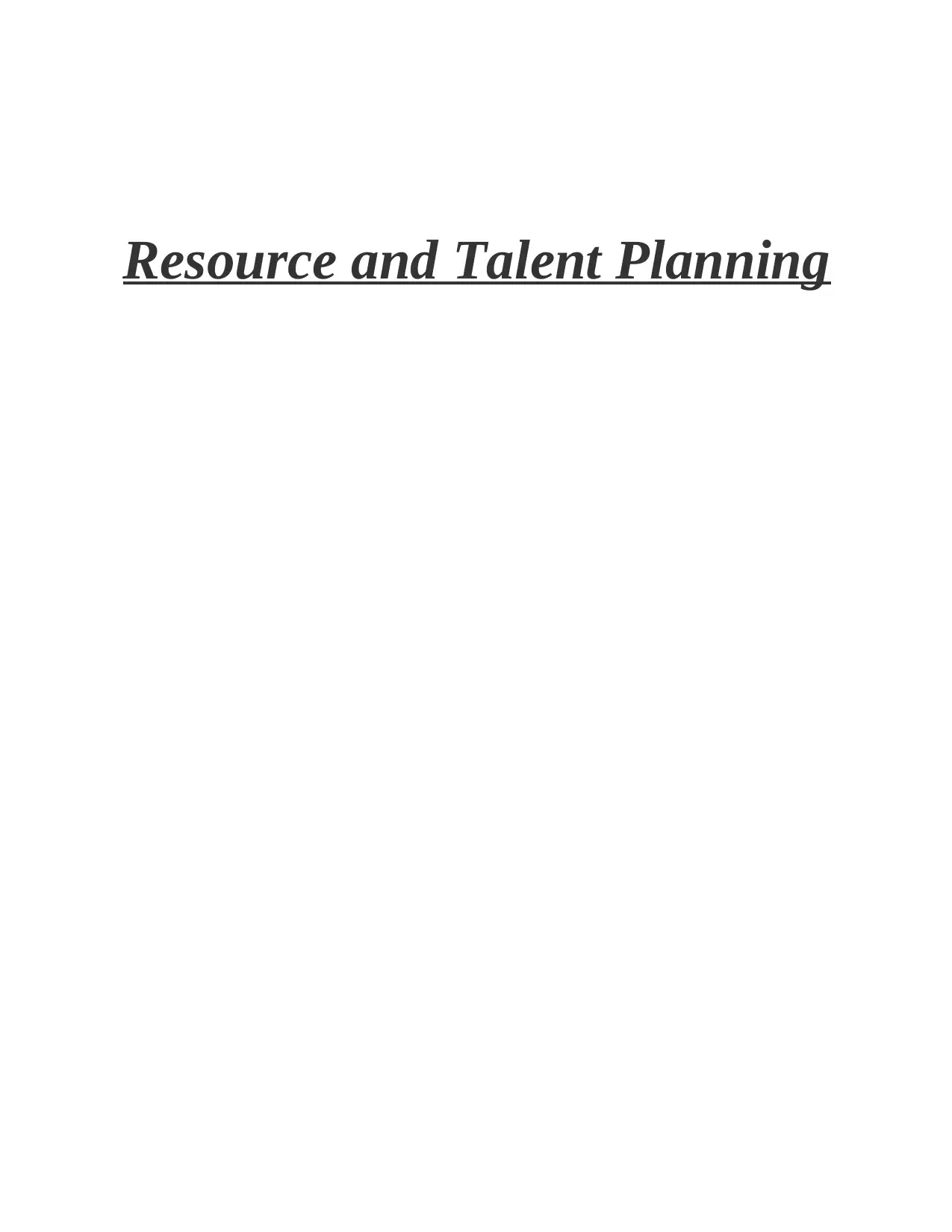
Resource and Talent Planning
Secure Best Marks with AI Grader
Need help grading? Try our AI Grader for instant feedback on your assignments.
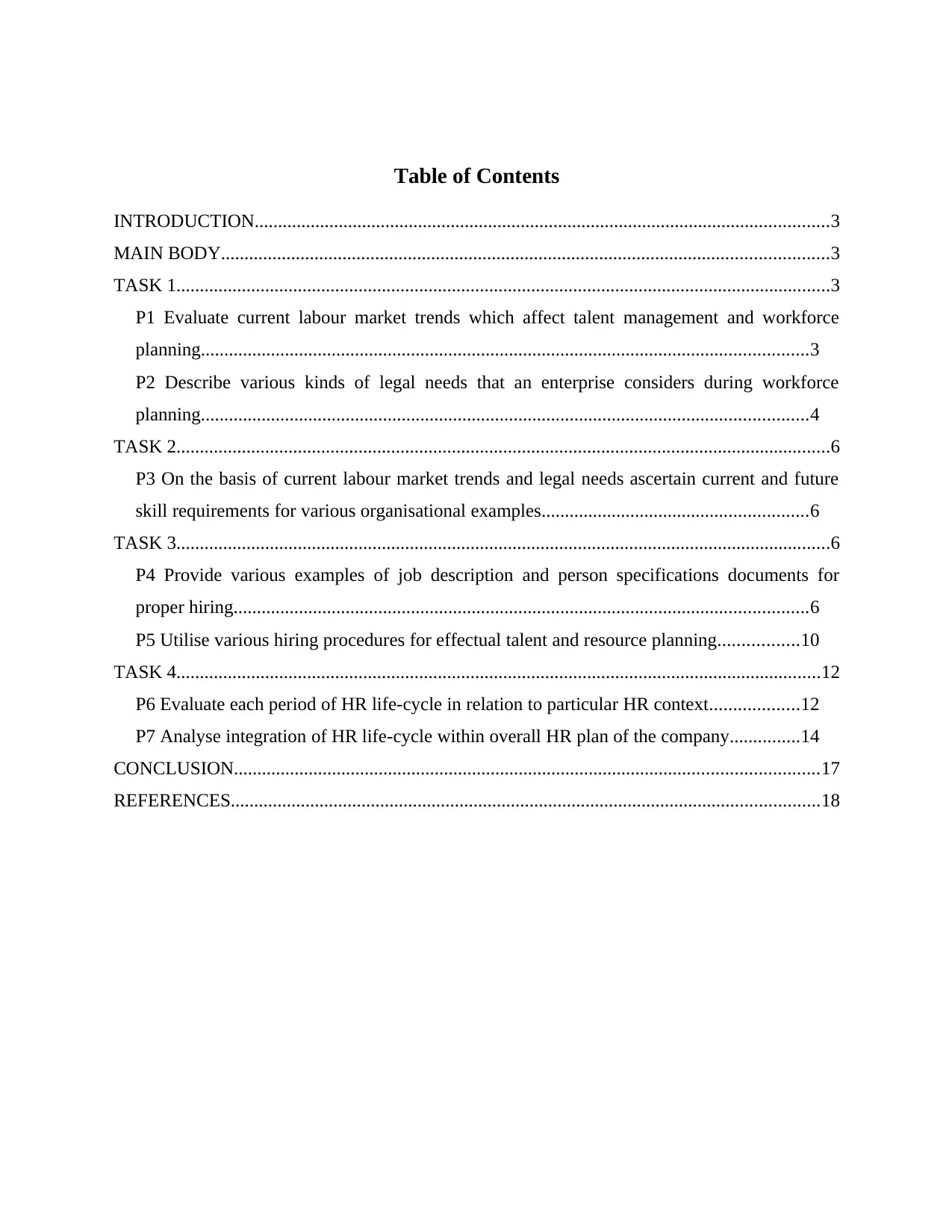
Table of Contents
INTRODUCTION...........................................................................................................................3
MAIN BODY..................................................................................................................................3
TASK 1............................................................................................................................................3
P1 Evaluate current labour market trends which affect talent management and workforce
planning..................................................................................................................................3
P2 Describe various kinds of legal needs that an enterprise considers during workforce
planning..................................................................................................................................4
TASK 2............................................................................................................................................6
P3 On the basis of current labour market trends and legal needs ascertain current and future
skill requirements for various organisational examples.........................................................6
TASK 3............................................................................................................................................6
P4 Provide various examples of job description and person specifications documents for
proper hiring...........................................................................................................................6
P5 Utilise various hiring procedures for effectual talent and resource planning.................10
TASK 4..........................................................................................................................................12
P6 Evaluate each period of HR life-cycle in relation to particular HR context...................12
P7 Analyse integration of HR life-cycle within overall HR plan of the company...............14
CONCLUSION.............................................................................................................................17
REFERENCES..............................................................................................................................18
INTRODUCTION...........................................................................................................................3
MAIN BODY..................................................................................................................................3
TASK 1............................................................................................................................................3
P1 Evaluate current labour market trends which affect talent management and workforce
planning..................................................................................................................................3
P2 Describe various kinds of legal needs that an enterprise considers during workforce
planning..................................................................................................................................4
TASK 2............................................................................................................................................6
P3 On the basis of current labour market trends and legal needs ascertain current and future
skill requirements for various organisational examples.........................................................6
TASK 3............................................................................................................................................6
P4 Provide various examples of job description and person specifications documents for
proper hiring...........................................................................................................................6
P5 Utilise various hiring procedures for effectual talent and resource planning.................10
TASK 4..........................................................................................................................................12
P6 Evaluate each period of HR life-cycle in relation to particular HR context...................12
P7 Analyse integration of HR life-cycle within overall HR plan of the company...............14
CONCLUSION.............................................................................................................................17
REFERENCES..............................................................................................................................18
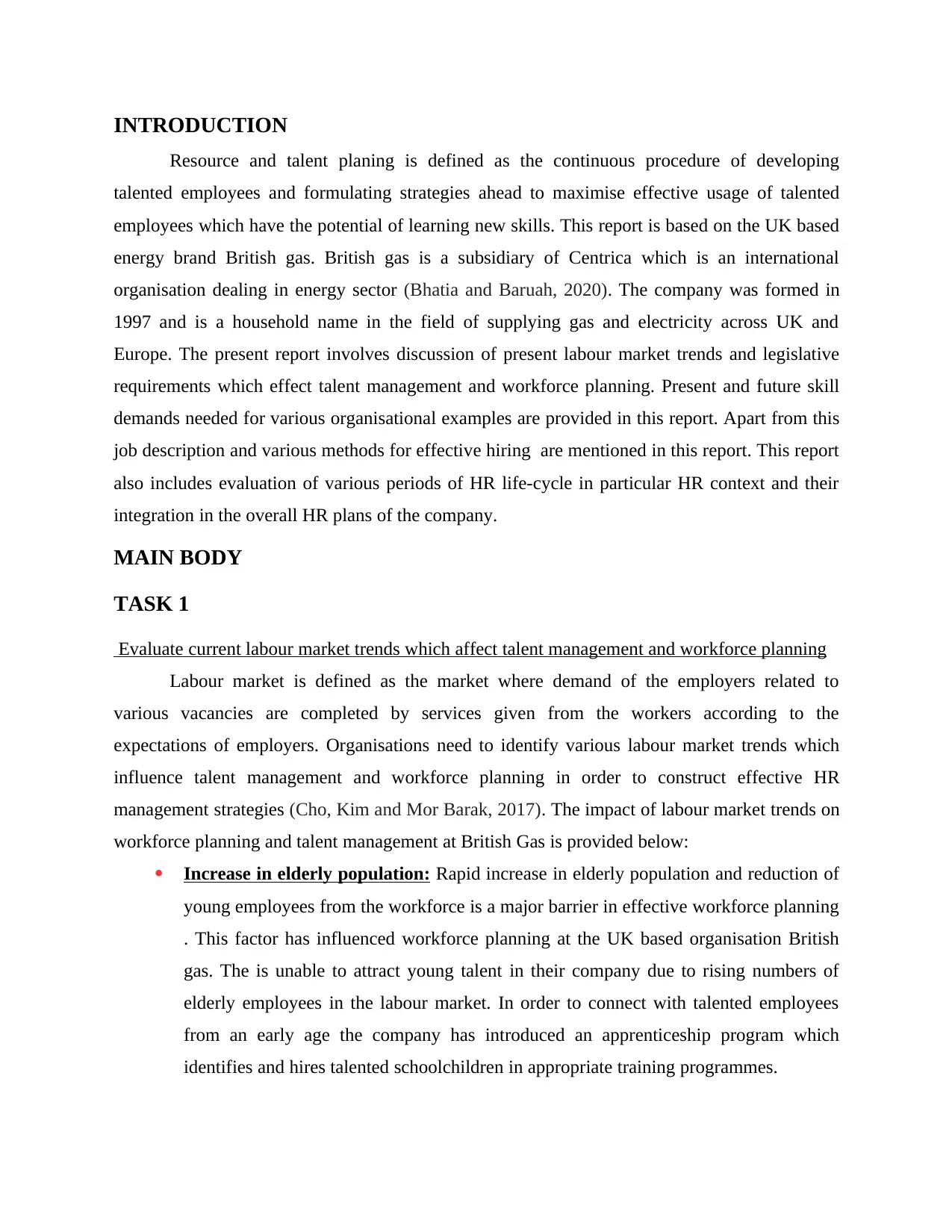
INTRODUCTION
Resource and talent planing is defined as the continuous procedure of developing
talented employees and formulating strategies ahead to maximise effective usage of talented
employees which have the potential of learning new skills. This report is based on the UK based
energy brand British gas. British gas is a subsidiary of Centrica which is an international
organisation dealing in energy sector (Bhatia and Baruah, 2020). The company was formed in
1997 and is a household name in the field of supplying gas and electricity across UK and
Europe. The present report involves discussion of present labour market trends and legislative
requirements which effect talent management and workforce planning. Present and future skill
demands needed for various organisational examples are provided in this report. Apart from this
job description and various methods for effective hiring are mentioned in this report. This report
also includes evaluation of various periods of HR life-cycle in particular HR context and their
integration in the overall HR plans of the company.
MAIN BODY
TASK 1
Evaluate current labour market trends which affect talent management and workforce planning
Labour market is defined as the market where demand of the employers related to
various vacancies are completed by services given from the workers according to the
expectations of employers. Organisations need to identify various labour market trends which
influence talent management and workforce planning in order to construct effective HR
management strategies (Cho, Kim and Mor Barak, 2017). The impact of labour market trends on
workforce planning and talent management at British Gas is provided below:
Increase in elderly population: Rapid increase in elderly population and reduction of
young employees from the workforce is a major barrier in effective workforce planning
. This factor has influenced workforce planning at the UK based organisation British
gas. The is unable to attract young talent in their company due to rising numbers of
elderly employees in the labour market. In order to connect with talented employees
from an early age the company has introduced an apprenticeship program which
identifies and hires talented schoolchildren in appropriate training programmes.
Resource and talent planing is defined as the continuous procedure of developing
talented employees and formulating strategies ahead to maximise effective usage of talented
employees which have the potential of learning new skills. This report is based on the UK based
energy brand British gas. British gas is a subsidiary of Centrica which is an international
organisation dealing in energy sector (Bhatia and Baruah, 2020). The company was formed in
1997 and is a household name in the field of supplying gas and electricity across UK and
Europe. The present report involves discussion of present labour market trends and legislative
requirements which effect talent management and workforce planning. Present and future skill
demands needed for various organisational examples are provided in this report. Apart from this
job description and various methods for effective hiring are mentioned in this report. This report
also includes evaluation of various periods of HR life-cycle in particular HR context and their
integration in the overall HR plans of the company.
MAIN BODY
TASK 1
Evaluate current labour market trends which affect talent management and workforce planning
Labour market is defined as the market where demand of the employers related to
various vacancies are completed by services given from the workers according to the
expectations of employers. Organisations need to identify various labour market trends which
influence talent management and workforce planning in order to construct effective HR
management strategies (Cho, Kim and Mor Barak, 2017). The impact of labour market trends on
workforce planning and talent management at British Gas is provided below:
Increase in elderly population: Rapid increase in elderly population and reduction of
young employees from the workforce is a major barrier in effective workforce planning
. This factor has influenced workforce planning at the UK based organisation British
gas. The is unable to attract young talent in their company due to rising numbers of
elderly employees in the labour market. In order to connect with talented employees
from an early age the company has introduced an apprenticeship program which
identifies and hires talented schoolchildren in appropriate training programmes.
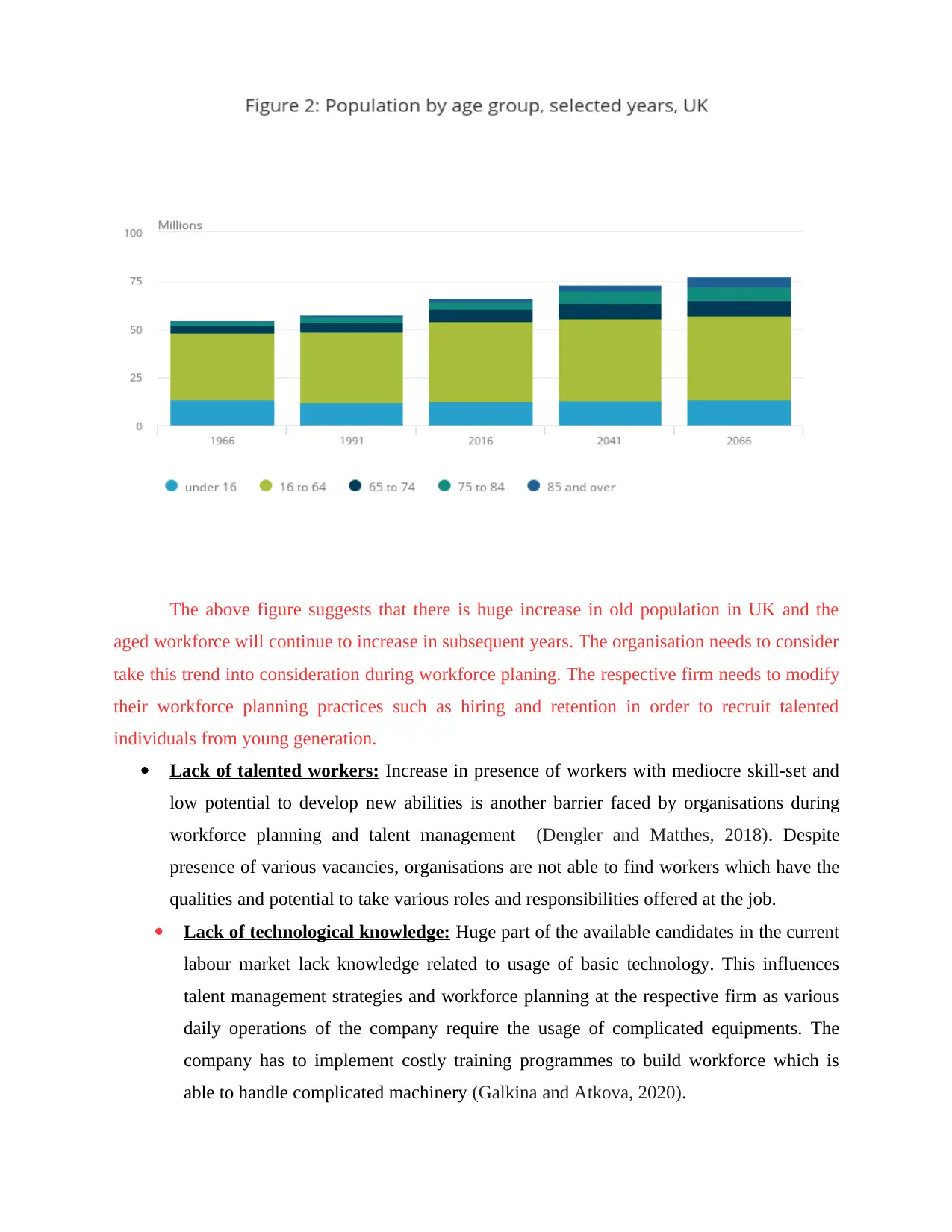
The above figure suggests that there is huge increase in old population in UK and the
aged workforce will continue to increase in subsequent years. The organisation needs to consider
take this trend into consideration during workforce planing. The respective firm needs to modify
their workforce planning practices such as hiring and retention in order to recruit talented
individuals from young generation.
Lack of talented workers: Increase in presence of workers with mediocre skill-set and
low potential to develop new abilities is another barrier faced by organisations during
workforce planning and talent management (Dengler and Matthes, 2018). Despite
presence of various vacancies, organisations are not able to find workers which have the
qualities and potential to take various roles and responsibilities offered at the job.
Lack of technological knowledge: Huge part of the available candidates in the current
labour market lack knowledge related to usage of basic technology. This influences
talent management strategies and workforce planning at the respective firm as various
daily operations of the company require the usage of complicated equipments. The
company has to implement costly training programmes to build workforce which is
able to handle complicated machinery (Galkina and Atkova, 2020).
aged workforce will continue to increase in subsequent years. The organisation needs to consider
take this trend into consideration during workforce planing. The respective firm needs to modify
their workforce planning practices such as hiring and retention in order to recruit talented
individuals from young generation.
Lack of talented workers: Increase in presence of workers with mediocre skill-set and
low potential to develop new abilities is another barrier faced by organisations during
workforce planning and talent management (Dengler and Matthes, 2018). Despite
presence of various vacancies, organisations are not able to find workers which have the
qualities and potential to take various roles and responsibilities offered at the job.
Lack of technological knowledge: Huge part of the available candidates in the current
labour market lack knowledge related to usage of basic technology. This influences
talent management strategies and workforce planning at the respective firm as various
daily operations of the company require the usage of complicated equipments. The
company has to implement costly training programmes to build workforce which is
able to handle complicated machinery (Galkina and Atkova, 2020).
Secure Best Marks with AI Grader
Need help grading? Try our AI Grader for instant feedback on your assignments.
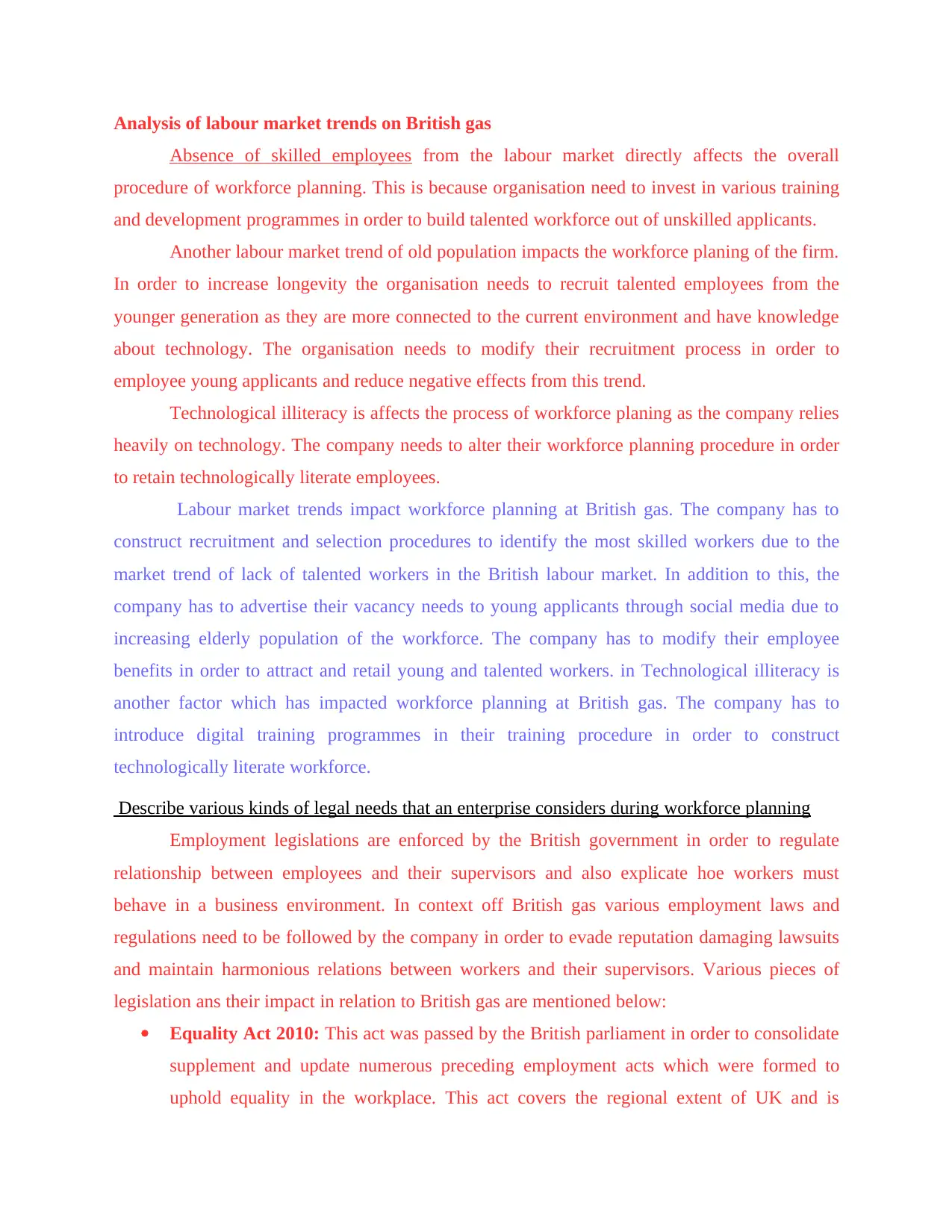
Analysis of labour market trends on British gas
Absence of skilled employees from the labour market directly affects the overall
procedure of workforce planning. This is because organisation need to invest in various training
and development programmes in order to build talented workforce out of unskilled applicants.
Another labour market trend of old population impacts the workforce planing of the firm.
In order to increase longevity the organisation needs to recruit talented employees from the
younger generation as they are more connected to the current environment and have knowledge
about technology. The organisation needs to modify their recruitment process in order to
employee young applicants and reduce negative effects from this trend.
Technological illiteracy is affects the process of workforce planing as the company relies
heavily on technology. The company needs to alter their workforce planning procedure in order
to retain technologically literate employees.
Labour market trends impact workforce planning at British gas. The company has to
construct recruitment and selection procedures to identify the most skilled workers due to the
market trend of lack of talented workers in the British labour market. In addition to this, the
company has to advertise their vacancy needs to young applicants through social media due to
increasing elderly population of the workforce. The company has to modify their employee
benefits in order to attract and retail young and talented workers. in Technological illiteracy is
another factor which has impacted workforce planning at British gas. The company has to
introduce digital training programmes in their training procedure in order to construct
technologically literate workforce.
Describe various kinds of legal needs that an enterprise considers during workforce planning
Employment legislations are enforced by the British government in order to regulate
relationship between employees and their supervisors and also explicate hoe workers must
behave in a business environment. In context off British gas various employment laws and
regulations need to be followed by the company in order to evade reputation damaging lawsuits
and maintain harmonious relations between workers and their supervisors. Various pieces of
legislation ans their impact in relation to British gas are mentioned below:
Equality Act 2010: This act was passed by the British parliament in order to consolidate
supplement and update numerous preceding employment acts which were formed to
uphold equality in the workplace. This act covers the regional extent of UK and is
Absence of skilled employees from the labour market directly affects the overall
procedure of workforce planning. This is because organisation need to invest in various training
and development programmes in order to build talented workforce out of unskilled applicants.
Another labour market trend of old population impacts the workforce planing of the firm.
In order to increase longevity the organisation needs to recruit talented employees from the
younger generation as they are more connected to the current environment and have knowledge
about technology. The organisation needs to modify their recruitment process in order to
employee young applicants and reduce negative effects from this trend.
Technological illiteracy is affects the process of workforce planing as the company relies
heavily on technology. The company needs to alter their workforce planning procedure in order
to retain technologically literate employees.
Labour market trends impact workforce planning at British gas. The company has to
construct recruitment and selection procedures to identify the most skilled workers due to the
market trend of lack of talented workers in the British labour market. In addition to this, the
company has to advertise their vacancy needs to young applicants through social media due to
increasing elderly population of the workforce. The company has to modify their employee
benefits in order to attract and retail young and talented workers. in Technological illiteracy is
another factor which has impacted workforce planning at British gas. The company has to
introduce digital training programmes in their training procedure in order to construct
technologically literate workforce.
Describe various kinds of legal needs that an enterprise considers during workforce planning
Employment legislations are enforced by the British government in order to regulate
relationship between employees and their supervisors and also explicate hoe workers must
behave in a business environment. In context off British gas various employment laws and
regulations need to be followed by the company in order to evade reputation damaging lawsuits
and maintain harmonious relations between workers and their supervisors. Various pieces of
legislation ans their impact in relation to British gas are mentioned below:
Equality Act 2010: This act was passed by the British parliament in order to consolidate
supplement and update numerous preceding employment acts which were formed to
uphold equality in the workplace. This act covers the regional extent of UK and is
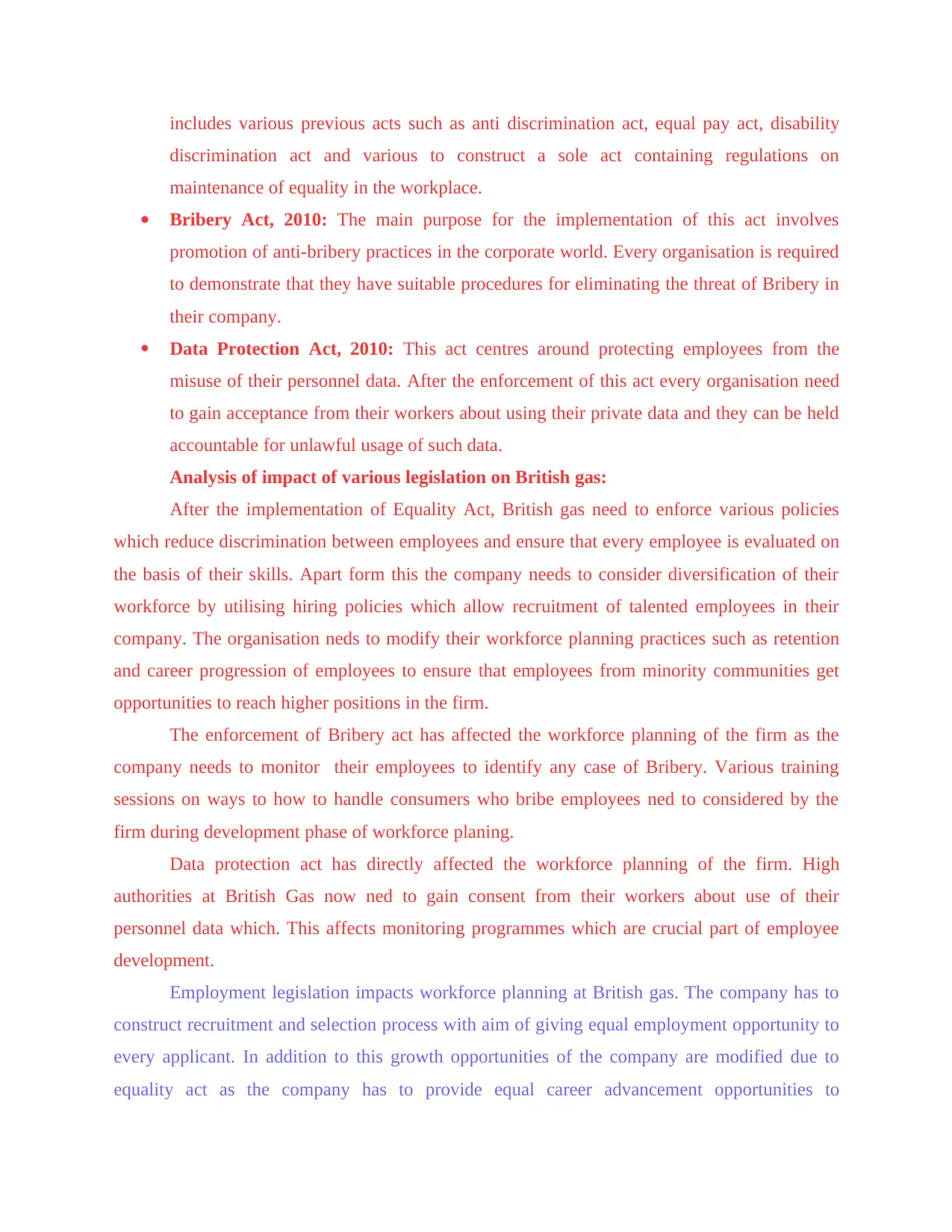
includes various previous acts such as anti discrimination act, equal pay act, disability
discrimination act and various to construct a sole act containing regulations on
maintenance of equality in the workplace.
Bribery Act, 2010: The main purpose for the implementation of this act involves
promotion of anti-bribery practices in the corporate world. Every organisation is required
to demonstrate that they have suitable procedures for eliminating the threat of Bribery in
their company.
Data Protection Act, 2010: This act centres around protecting employees from the
misuse of their personnel data. After the enforcement of this act every organisation need
to gain acceptance from their workers about using their private data and they can be held
accountable for unlawful usage of such data.
Analysis of impact of various legislation on British gas:
After the implementation of Equality Act, British gas need to enforce various policies
which reduce discrimination between employees and ensure that every employee is evaluated on
the basis of their skills. Apart form this the company needs to consider diversification of their
workforce by utilising hiring policies which allow recruitment of talented employees in their
company. The organisation neds to modify their workforce planning practices such as retention
and career progression of employees to ensure that employees from minority communities get
opportunities to reach higher positions in the firm.
The enforcement of Bribery act has affected the workforce planning of the firm as the
company needs to monitor their employees to identify any case of Bribery. Various training
sessions on ways to how to handle consumers who bribe employees ned to considered by the
firm during development phase of workforce planing.
Data protection act has directly affected the workforce planning of the firm. High
authorities at British Gas now ned to gain consent from their workers about use of their
personnel data which. This affects monitoring programmes which are crucial part of employee
development.
Employment legislation impacts workforce planning at British gas. The company has to
construct recruitment and selection process with aim of giving equal employment opportunity to
every applicant. In addition to this growth opportunities of the company are modified due to
equality act as the company has to provide equal career advancement opportunities to
discrimination act and various to construct a sole act containing regulations on
maintenance of equality in the workplace.
Bribery Act, 2010: The main purpose for the implementation of this act involves
promotion of anti-bribery practices in the corporate world. Every organisation is required
to demonstrate that they have suitable procedures for eliminating the threat of Bribery in
their company.
Data Protection Act, 2010: This act centres around protecting employees from the
misuse of their personnel data. After the enforcement of this act every organisation need
to gain acceptance from their workers about using their private data and they can be held
accountable for unlawful usage of such data.
Analysis of impact of various legislation on British gas:
After the implementation of Equality Act, British gas need to enforce various policies
which reduce discrimination between employees and ensure that every employee is evaluated on
the basis of their skills. Apart form this the company needs to consider diversification of their
workforce by utilising hiring policies which allow recruitment of talented employees in their
company. The organisation neds to modify their workforce planning practices such as retention
and career progression of employees to ensure that employees from minority communities get
opportunities to reach higher positions in the firm.
The enforcement of Bribery act has affected the workforce planning of the firm as the
company needs to monitor their employees to identify any case of Bribery. Various training
sessions on ways to how to handle consumers who bribe employees ned to considered by the
firm during development phase of workforce planing.
Data protection act has directly affected the workforce planning of the firm. High
authorities at British Gas now ned to gain consent from their workers about use of their
personnel data which. This affects monitoring programmes which are crucial part of employee
development.
Employment legislation impacts workforce planning at British gas. The company has to
construct recruitment and selection process with aim of giving equal employment opportunity to
every applicant. In addition to this growth opportunities of the company are modified due to
equality act as the company has to provide equal career advancement opportunities to
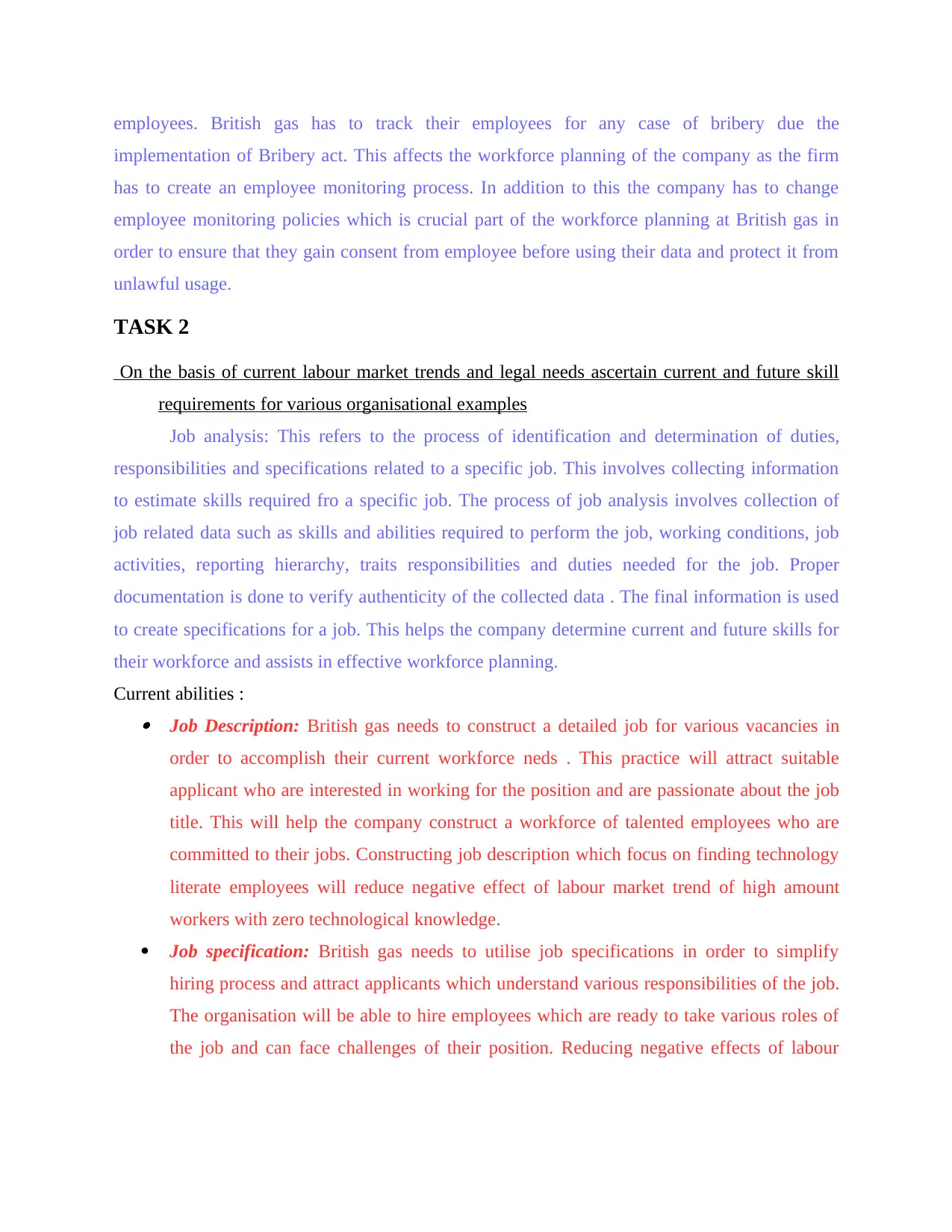
employees. British gas has to track their employees for any case of bribery due the
implementation of Bribery act. This affects the workforce planning of the company as the firm
has to create an employee monitoring process. In addition to this the company has to change
employee monitoring policies which is crucial part of the workforce planning at British gas in
order to ensure that they gain consent from employee before using their data and protect it from
unlawful usage.
TASK 2
On the basis of current labour market trends and legal needs ascertain current and future skill
requirements for various organisational examples
Job analysis: This refers to the process of identification and determination of duties,
responsibilities and specifications related to a specific job. This involves collecting information
to estimate skills required fro a specific job. The process of job analysis involves collection of
job related data such as skills and abilities required to perform the job, working conditions, job
activities, reporting hierarchy, traits responsibilities and duties needed for the job. Proper
documentation is done to verify authenticity of the collected data . The final information is used
to create specifications for a job. This helps the company determine current and future skills for
their workforce and assists in effective workforce planning.
Current abilities : Job Description: British gas needs to construct a detailed job for various vacancies in
order to accomplish their current workforce neds . This practice will attract suitable
applicant who are interested in working for the position and are passionate about the job
title. This will help the company construct a workforce of talented employees who are
committed to their jobs. Constructing job description which focus on finding technology
literate employees will reduce negative effect of labour market trend of high amount
workers with zero technological knowledge.
Job specification: British gas needs to utilise job specifications in order to simplify
hiring process and attract applicants which understand various responsibilities of the job.
The organisation will be able to hire employees which are ready to take various roles of
the job and can face challenges of their position. Reducing negative effects of labour
implementation of Bribery act. This affects the workforce planning of the company as the firm
has to create an employee monitoring process. In addition to this the company has to change
employee monitoring policies which is crucial part of the workforce planning at British gas in
order to ensure that they gain consent from employee before using their data and protect it from
unlawful usage.
TASK 2
On the basis of current labour market trends and legal needs ascertain current and future skill
requirements for various organisational examples
Job analysis: This refers to the process of identification and determination of duties,
responsibilities and specifications related to a specific job. This involves collecting information
to estimate skills required fro a specific job. The process of job analysis involves collection of
job related data such as skills and abilities required to perform the job, working conditions, job
activities, reporting hierarchy, traits responsibilities and duties needed for the job. Proper
documentation is done to verify authenticity of the collected data . The final information is used
to create specifications for a job. This helps the company determine current and future skills for
their workforce and assists in effective workforce planning.
Current abilities : Job Description: British gas needs to construct a detailed job for various vacancies in
order to accomplish their current workforce neds . This practice will attract suitable
applicant who are interested in working for the position and are passionate about the job
title. This will help the company construct a workforce of talented employees who are
committed to their jobs. Constructing job description which focus on finding technology
literate employees will reduce negative effect of labour market trend of high amount
workers with zero technological knowledge.
Job specification: British gas needs to utilise job specifications in order to simplify
hiring process and attract applicants which understand various responsibilities of the job.
The organisation will be able to hire employees which are ready to take various roles of
the job and can face challenges of their position. Reducing negative effects of labour
Paraphrase This Document
Need a fresh take? Get an instant paraphrase of this document with our AI Paraphraser
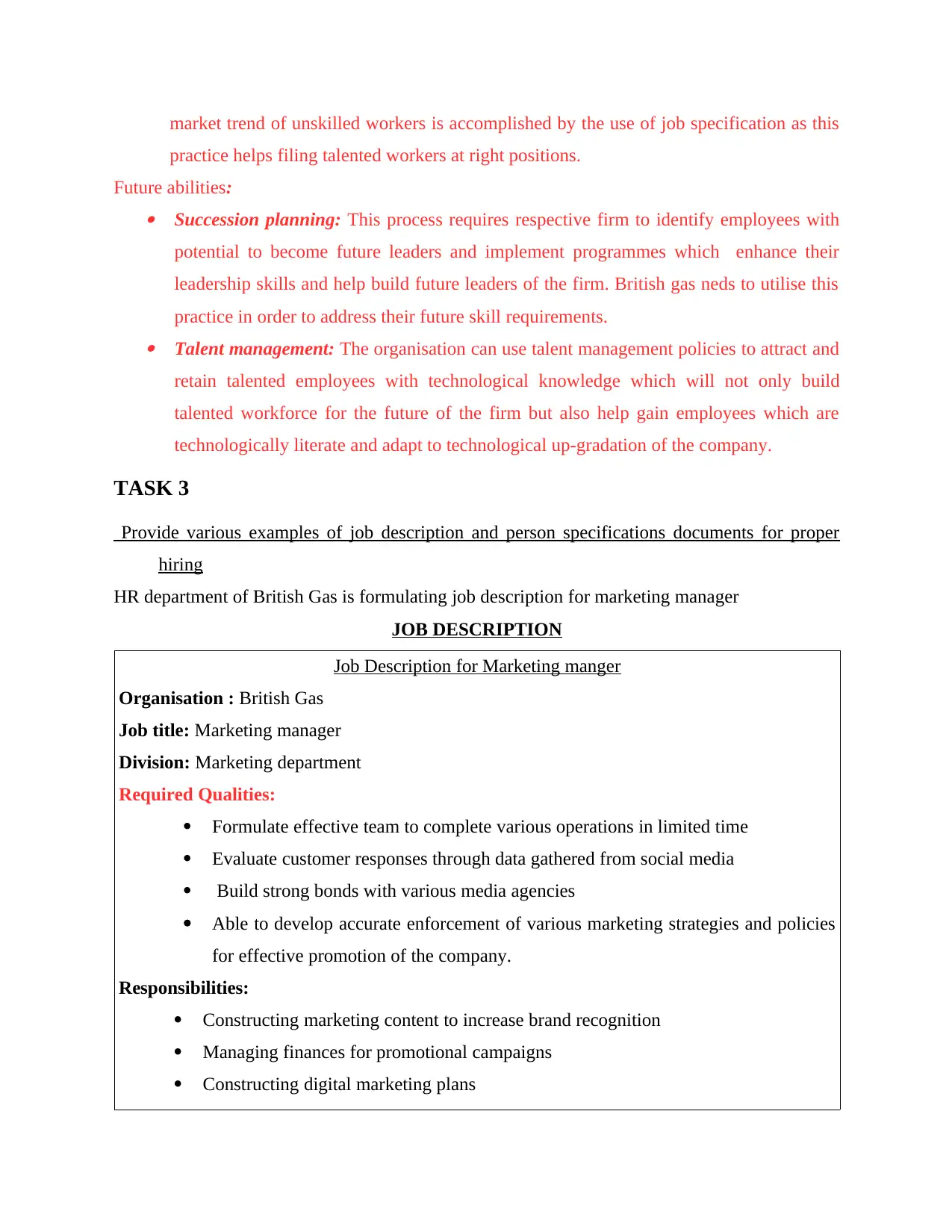
market trend of unskilled workers is accomplished by the use of job specification as this
practice helps filing talented workers at right positions.
Future abilities: Succession planning: This process requires respective firm to identify employees with
potential to become future leaders and implement programmes which enhance their
leadership skills and help build future leaders of the firm. British gas neds to utilise this
practice in order to address their future skill requirements. Talent management: The organisation can use talent management policies to attract and
retain talented employees with technological knowledge which will not only build
talented workforce for the future of the firm but also help gain employees which are
technologically literate and adapt to technological up-gradation of the company.
TASK 3
Provide various examples of job description and person specifications documents for proper
hiring
HR department of British Gas is formulating job description for marketing manager
JOB DESCRIPTION
Job Description for Marketing manger
Organisation : British Gas
Job title: Marketing manager
Division: Marketing department
Required Qualities:
Formulate effective team to complete various operations in limited time
Evaluate customer responses through data gathered from social media
Build strong bonds with various media agencies
Able to develop accurate enforcement of various marketing strategies and policies
for effective promotion of the company.
Responsibilities:
Constructing marketing content to increase brand recognition
Managing finances for promotional campaigns
Constructing digital marketing plans
practice helps filing talented workers at right positions.
Future abilities: Succession planning: This process requires respective firm to identify employees with
potential to become future leaders and implement programmes which enhance their
leadership skills and help build future leaders of the firm. British gas neds to utilise this
practice in order to address their future skill requirements. Talent management: The organisation can use talent management policies to attract and
retain talented employees with technological knowledge which will not only build
talented workforce for the future of the firm but also help gain employees which are
technologically literate and adapt to technological up-gradation of the company.
TASK 3
Provide various examples of job description and person specifications documents for proper
hiring
HR department of British Gas is formulating job description for marketing manager
JOB DESCRIPTION
Job Description for Marketing manger
Organisation : British Gas
Job title: Marketing manager
Division: Marketing department
Required Qualities:
Formulate effective team to complete various operations in limited time
Evaluate customer responses through data gathered from social media
Build strong bonds with various media agencies
Able to develop accurate enforcement of various marketing strategies and policies
for effective promotion of the company.
Responsibilities:
Constructing marketing content to increase brand recognition
Managing finances for promotional campaigns
Constructing digital marketing plans
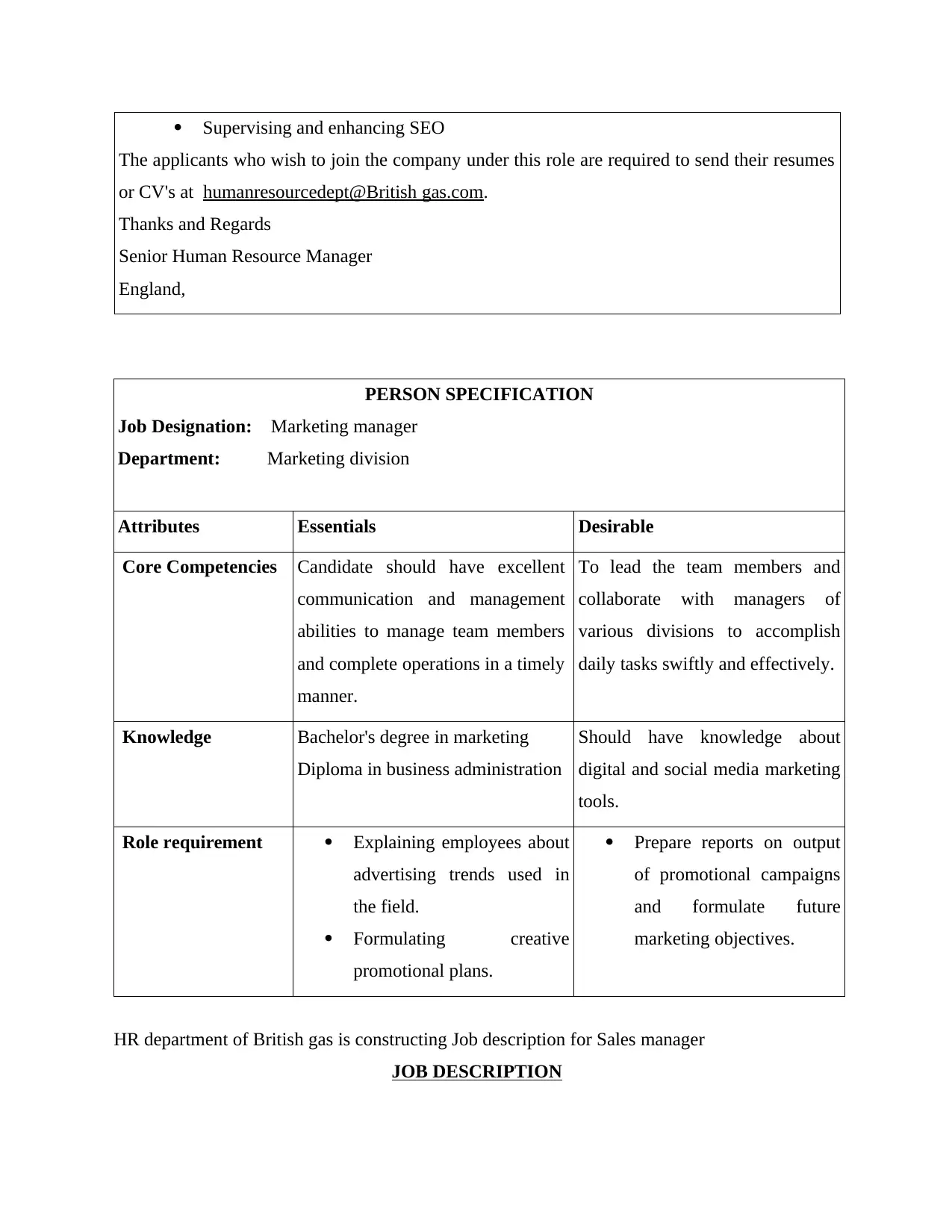
Supervising and enhancing SEO
The applicants who wish to join the company under this role are required to send their resumes
or CV's at humanresourcedept@British gas.com.
Thanks and Regards
Senior Human Resource Manager
England,
PERSON SPECIFICATION
Job Designation: Marketing manager
Department: Marketing division
Attributes Essentials Desirable
Core Competencies Candidate should have excellent
communication and management
abilities to manage team members
and complete operations in a timely
manner.
To lead the team members and
collaborate with managers of
various divisions to accomplish
daily tasks swiftly and effectively.
Knowledge Bachelor's degree in marketing
Diploma in business administration
Should have knowledge about
digital and social media marketing
tools.
Role requirement Explaining employees about
advertising trends used in
the field.
Formulating creative
promotional plans.
Prepare reports on output
of promotional campaigns
and formulate future
marketing objectives.
HR department of British gas is constructing Job description for Sales manager
JOB DESCRIPTION
The applicants who wish to join the company under this role are required to send their resumes
or CV's at humanresourcedept@British gas.com.
Thanks and Regards
Senior Human Resource Manager
England,
PERSON SPECIFICATION
Job Designation: Marketing manager
Department: Marketing division
Attributes Essentials Desirable
Core Competencies Candidate should have excellent
communication and management
abilities to manage team members
and complete operations in a timely
manner.
To lead the team members and
collaborate with managers of
various divisions to accomplish
daily tasks swiftly and effectively.
Knowledge Bachelor's degree in marketing
Diploma in business administration
Should have knowledge about
digital and social media marketing
tools.
Role requirement Explaining employees about
advertising trends used in
the field.
Formulating creative
promotional plans.
Prepare reports on output
of promotional campaigns
and formulate future
marketing objectives.
HR department of British gas is constructing Job description for Sales manager
JOB DESCRIPTION
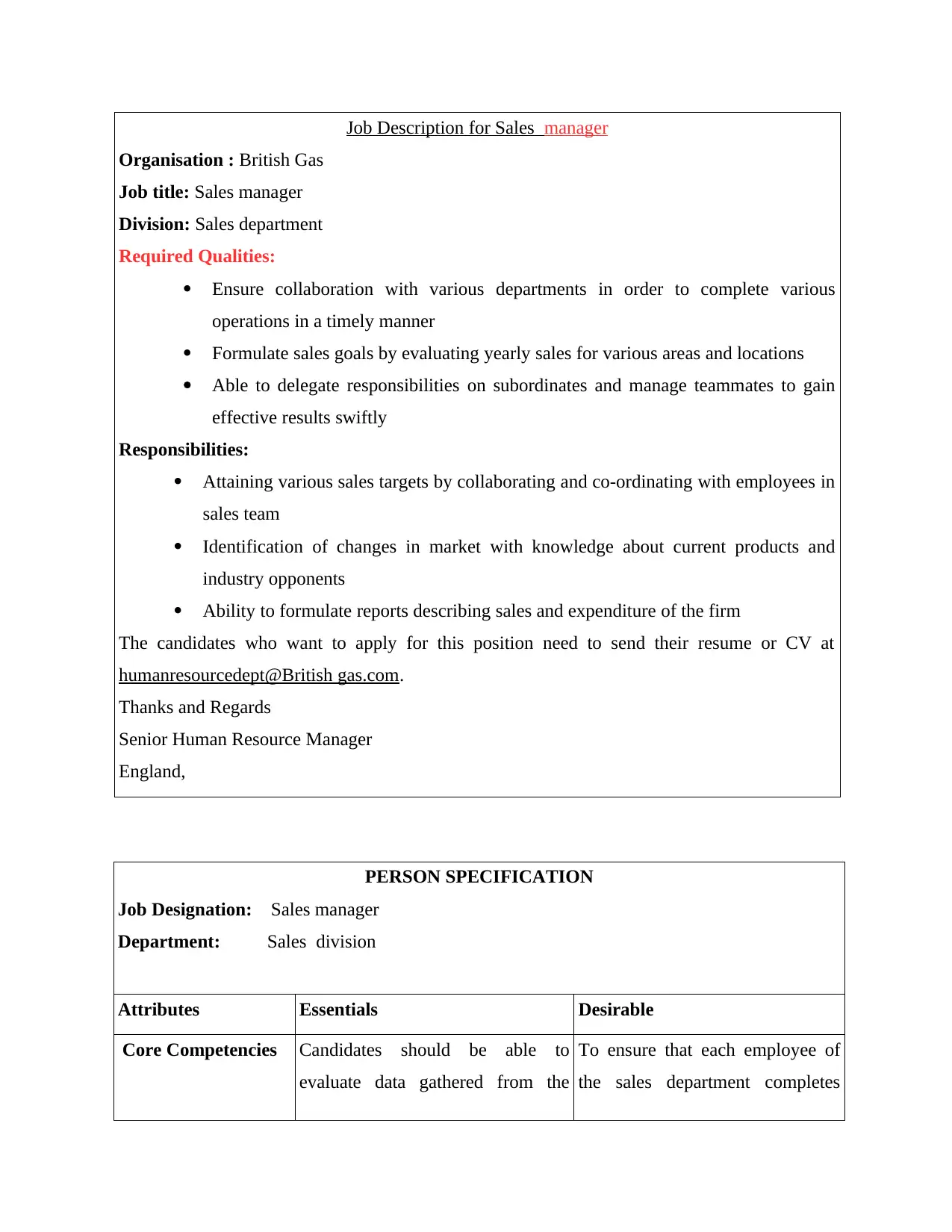
Job Description for Sales manager
Organisation : British Gas
Job title: Sales manager
Division: Sales department
Required Qualities:
Ensure collaboration with various departments in order to complete various
operations in a timely manner
Formulate sales goals by evaluating yearly sales for various areas and locations
Able to delegate responsibilities on subordinates and manage teammates to gain
effective results swiftly
Responsibilities:
Attaining various sales targets by collaborating and co-ordinating with employees in
sales team
Identification of changes in market with knowledge about current products and
industry opponents
Ability to formulate reports describing sales and expenditure of the firm
The candidates who want to apply for this position need to send their resume or CV at
humanresourcedept@British gas.com.
Thanks and Regards
Senior Human Resource Manager
England,
PERSON SPECIFICATION
Job Designation: Sales manager
Department: Sales division
Attributes Essentials Desirable
Core Competencies Candidates should be able to
evaluate data gathered from the
To ensure that each employee of
the sales department completes
Organisation : British Gas
Job title: Sales manager
Division: Sales department
Required Qualities:
Ensure collaboration with various departments in order to complete various
operations in a timely manner
Formulate sales goals by evaluating yearly sales for various areas and locations
Able to delegate responsibilities on subordinates and manage teammates to gain
effective results swiftly
Responsibilities:
Attaining various sales targets by collaborating and co-ordinating with employees in
sales team
Identification of changes in market with knowledge about current products and
industry opponents
Ability to formulate reports describing sales and expenditure of the firm
The candidates who want to apply for this position need to send their resume or CV at
humanresourcedept@British gas.com.
Thanks and Regards
Senior Human Resource Manager
England,
PERSON SPECIFICATION
Job Designation: Sales manager
Department: Sales division
Attributes Essentials Desirable
Core Competencies Candidates should be able to
evaluate data gathered from the
To ensure that each employee of
the sales department completes
Secure Best Marks with AI Grader
Need help grading? Try our AI Grader for instant feedback on your assignments.
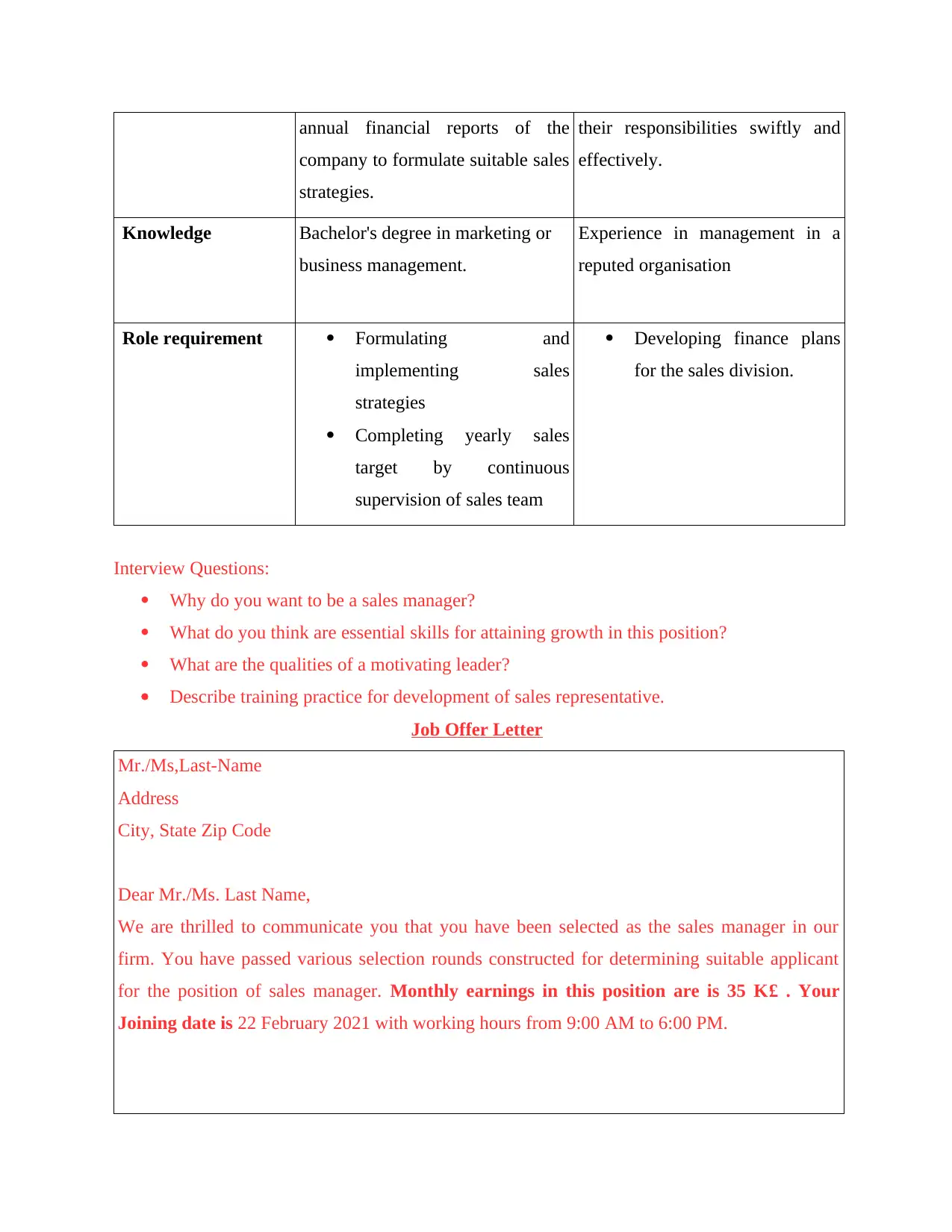
annual financial reports of the
company to formulate suitable sales
strategies.
their responsibilities swiftly and
effectively.
Knowledge Bachelor's degree in marketing or
business management.
Experience in management in a
reputed organisation
Role requirement Formulating and
implementing sales
strategies
Completing yearly sales
target by continuous
supervision of sales team
Developing finance plans
for the sales division.
Interview Questions:
Why do you want to be a sales manager?
What do you think are essential skills for attaining growth in this position?
What are the qualities of a motivating leader?
Describe training practice for development of sales representative.
Job Offer Letter
Mr./Ms,Last-Name
Address
City, State Zip Code
Dear Mr./Ms. Last Name,
We are thrilled to communicate you that you have been selected as the sales manager in our
firm. You have passed various selection rounds constructed for determining suitable applicant
for the position of sales manager. Monthly earnings in this position are is 35 K£ . Your
Joining date is 22 February 2021 with working hours from 9:00 AM to 6:00 PM.
company to formulate suitable sales
strategies.
their responsibilities swiftly and
effectively.
Knowledge Bachelor's degree in marketing or
business management.
Experience in management in a
reputed organisation
Role requirement Formulating and
implementing sales
strategies
Completing yearly sales
target by continuous
supervision of sales team
Developing finance plans
for the sales division.
Interview Questions:
Why do you want to be a sales manager?
What do you think are essential skills for attaining growth in this position?
What are the qualities of a motivating leader?
Describe training practice for development of sales representative.
Job Offer Letter
Mr./Ms,Last-Name
Address
City, State Zip Code
Dear Mr./Ms. Last Name,
We are thrilled to communicate you that you have been selected as the sales manager in our
firm. You have passed various selection rounds constructed for determining suitable applicant
for the position of sales manager. Monthly earnings in this position are is 35 K£ . Your
Joining date is 22 February 2021 with working hours from 9:00 AM to 6:00 PM.
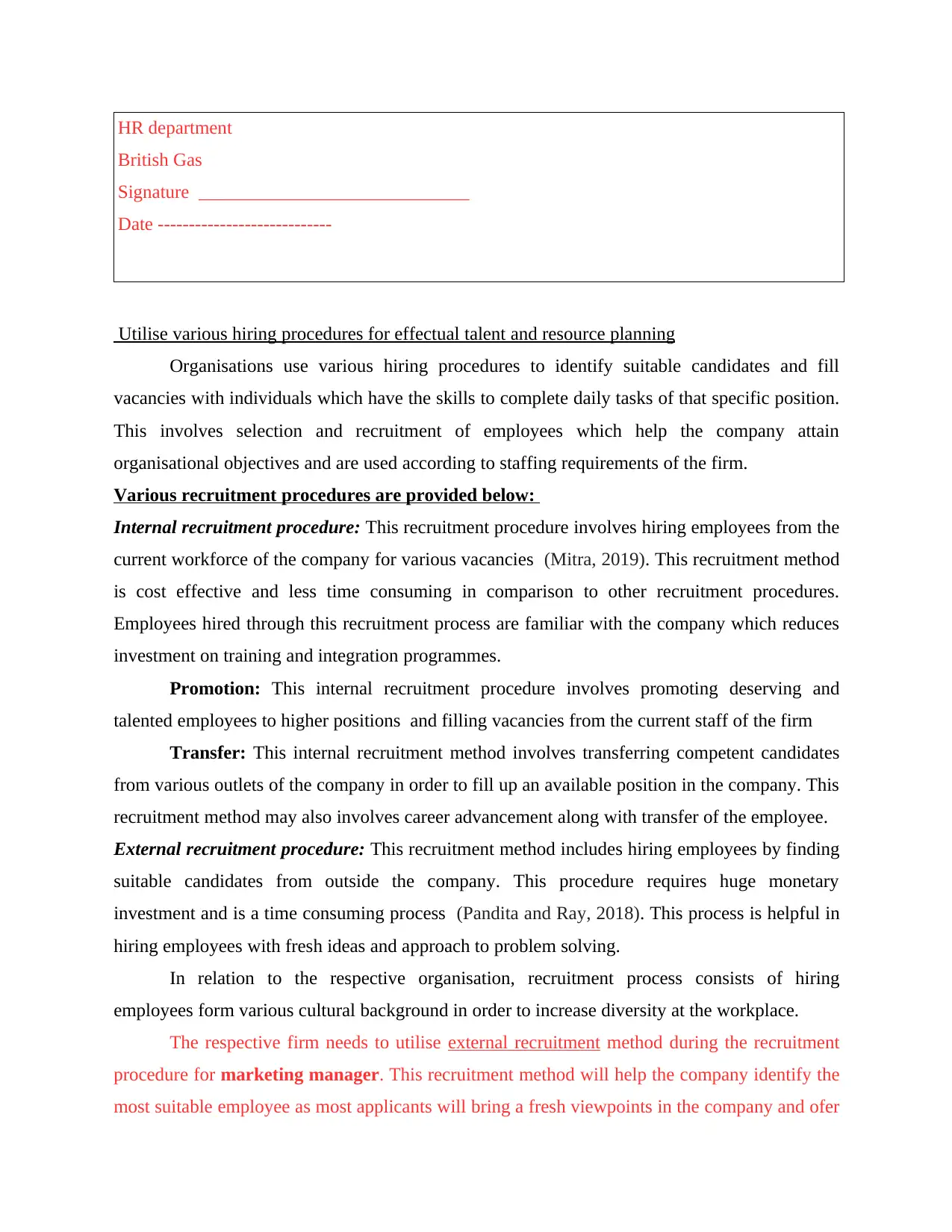
HR department
British Gas
Signature _____________________________
Date ----------------------------
Utilise various hiring procedures for effectual talent and resource planning
Organisations use various hiring procedures to identify suitable candidates and fill
vacancies with individuals which have the skills to complete daily tasks of that specific position.
This involves selection and recruitment of employees which help the company attain
organisational objectives and are used according to staffing requirements of the firm.
Various recruitment procedures are provided below:
Internal recruitment procedure: This recruitment procedure involves hiring employees from the
current workforce of the company for various vacancies (Mitra, 2019). This recruitment method
is cost effective and less time consuming in comparison to other recruitment procedures.
Employees hired through this recruitment process are familiar with the company which reduces
investment on training and integration programmes.
Promotion: This internal recruitment procedure involves promoting deserving and
talented employees to higher positions and filling vacancies from the current staff of the firm
Transfer: This internal recruitment method involves transferring competent candidates
from various outlets of the company in order to fill up an available position in the company. This
recruitment method may also involves career advancement along with transfer of the employee.
External recruitment procedure: This recruitment method includes hiring employees by finding
suitable candidates from outside the company. This procedure requires huge monetary
investment and is a time consuming process (Pandita and Ray, 2018). This process is helpful in
hiring employees with fresh ideas and approach to problem solving.
In relation to the respective organisation, recruitment process consists of hiring
employees form various cultural background in order to increase diversity at the workplace.
The respective firm needs to utilise external recruitment method during the recruitment
procedure for marketing manager. This recruitment method will help the company identify the
most suitable employee as most applicants will bring a fresh viewpoints in the company and ofer
British Gas
Signature _____________________________
Date ----------------------------
Utilise various hiring procedures for effectual talent and resource planning
Organisations use various hiring procedures to identify suitable candidates and fill
vacancies with individuals which have the skills to complete daily tasks of that specific position.
This involves selection and recruitment of employees which help the company attain
organisational objectives and are used according to staffing requirements of the firm.
Various recruitment procedures are provided below:
Internal recruitment procedure: This recruitment procedure involves hiring employees from the
current workforce of the company for various vacancies (Mitra, 2019). This recruitment method
is cost effective and less time consuming in comparison to other recruitment procedures.
Employees hired through this recruitment process are familiar with the company which reduces
investment on training and integration programmes.
Promotion: This internal recruitment procedure involves promoting deserving and
talented employees to higher positions and filling vacancies from the current staff of the firm
Transfer: This internal recruitment method involves transferring competent candidates
from various outlets of the company in order to fill up an available position in the company. This
recruitment method may also involves career advancement along with transfer of the employee.
External recruitment procedure: This recruitment method includes hiring employees by finding
suitable candidates from outside the company. This procedure requires huge monetary
investment and is a time consuming process (Pandita and Ray, 2018). This process is helpful in
hiring employees with fresh ideas and approach to problem solving.
In relation to the respective organisation, recruitment process consists of hiring
employees form various cultural background in order to increase diversity at the workplace.
The respective firm needs to utilise external recruitment method during the recruitment
procedure for marketing manager. This recruitment method will help the company identify the
most suitable employee as most applicants will bring a fresh viewpoints in the company and ofer
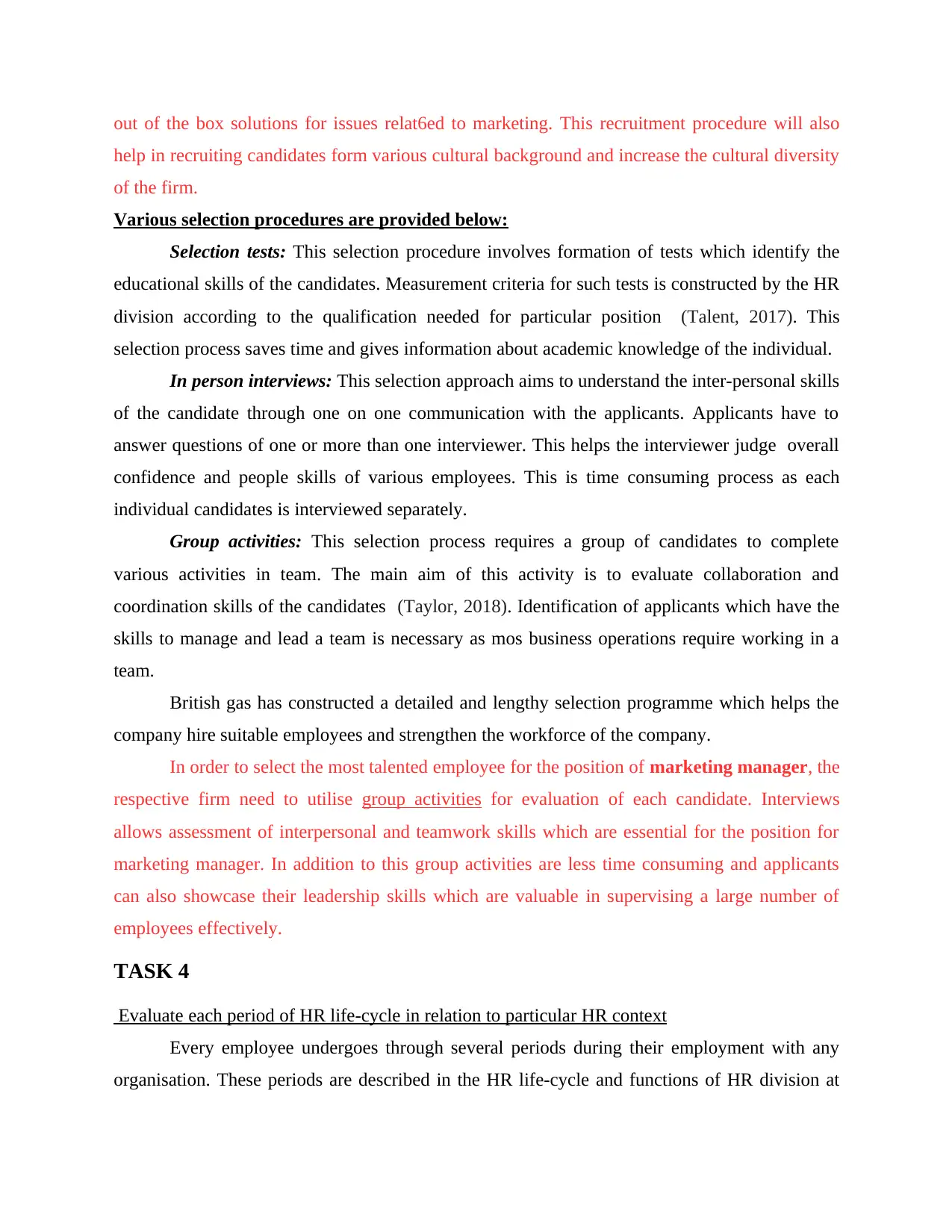
out of the box solutions for issues relat6ed to marketing. This recruitment procedure will also
help in recruiting candidates form various cultural background and increase the cultural diversity
of the firm.
Various selection procedures are provided below:
Selection tests: This selection procedure involves formation of tests which identify the
educational skills of the candidates. Measurement criteria for such tests is constructed by the HR
division according to the qualification needed for particular position (Talent, 2017). This
selection process saves time and gives information about academic knowledge of the individual.
In person interviews: This selection approach aims to understand the inter-personal skills
of the candidate through one on one communication with the applicants. Applicants have to
answer questions of one or more than one interviewer. This helps the interviewer judge overall
confidence and people skills of various employees. This is time consuming process as each
individual candidates is interviewed separately.
Group activities: This selection process requires a group of candidates to complete
various activities in team. The main aim of this activity is to evaluate collaboration and
coordination skills of the candidates (Taylor, 2018). Identification of applicants which have the
skills to manage and lead a team is necessary as mos business operations require working in a
team.
British gas has constructed a detailed and lengthy selection programme which helps the
company hire suitable employees and strengthen the workforce of the company.
In order to select the most talented employee for the position of marketing manager, the
respective firm need to utilise group activities for evaluation of each candidate. Interviews
allows assessment of interpersonal and teamwork skills which are essential for the position for
marketing manager. In addition to this group activities are less time consuming and applicants
can also showcase their leadership skills which are valuable in supervising a large number of
employees effectively.
TASK 4
Evaluate each period of HR life-cycle in relation to particular HR context
Every employee undergoes through several periods during their employment with any
organisation. These periods are described in the HR life-cycle and functions of HR division at
help in recruiting candidates form various cultural background and increase the cultural diversity
of the firm.
Various selection procedures are provided below:
Selection tests: This selection procedure involves formation of tests which identify the
educational skills of the candidates. Measurement criteria for such tests is constructed by the HR
division according to the qualification needed for particular position (Talent, 2017). This
selection process saves time and gives information about academic knowledge of the individual.
In person interviews: This selection approach aims to understand the inter-personal skills
of the candidate through one on one communication with the applicants. Applicants have to
answer questions of one or more than one interviewer. This helps the interviewer judge overall
confidence and people skills of various employees. This is time consuming process as each
individual candidates is interviewed separately.
Group activities: This selection process requires a group of candidates to complete
various activities in team. The main aim of this activity is to evaluate collaboration and
coordination skills of the candidates (Taylor, 2018). Identification of applicants which have the
skills to manage and lead a team is necessary as mos business operations require working in a
team.
British gas has constructed a detailed and lengthy selection programme which helps the
company hire suitable employees and strengthen the workforce of the company.
In order to select the most talented employee for the position of marketing manager, the
respective firm need to utilise group activities for evaluation of each candidate. Interviews
allows assessment of interpersonal and teamwork skills which are essential for the position for
marketing manager. In addition to this group activities are less time consuming and applicants
can also showcase their leadership skills which are valuable in supervising a large number of
employees effectively.
TASK 4
Evaluate each period of HR life-cycle in relation to particular HR context
Every employee undergoes through several periods during their employment with any
organisation. These periods are described in the HR life-cycle and functions of HR division at
Paraphrase This Document
Need a fresh take? Get an instant paraphrase of this document with our AI Paraphraser
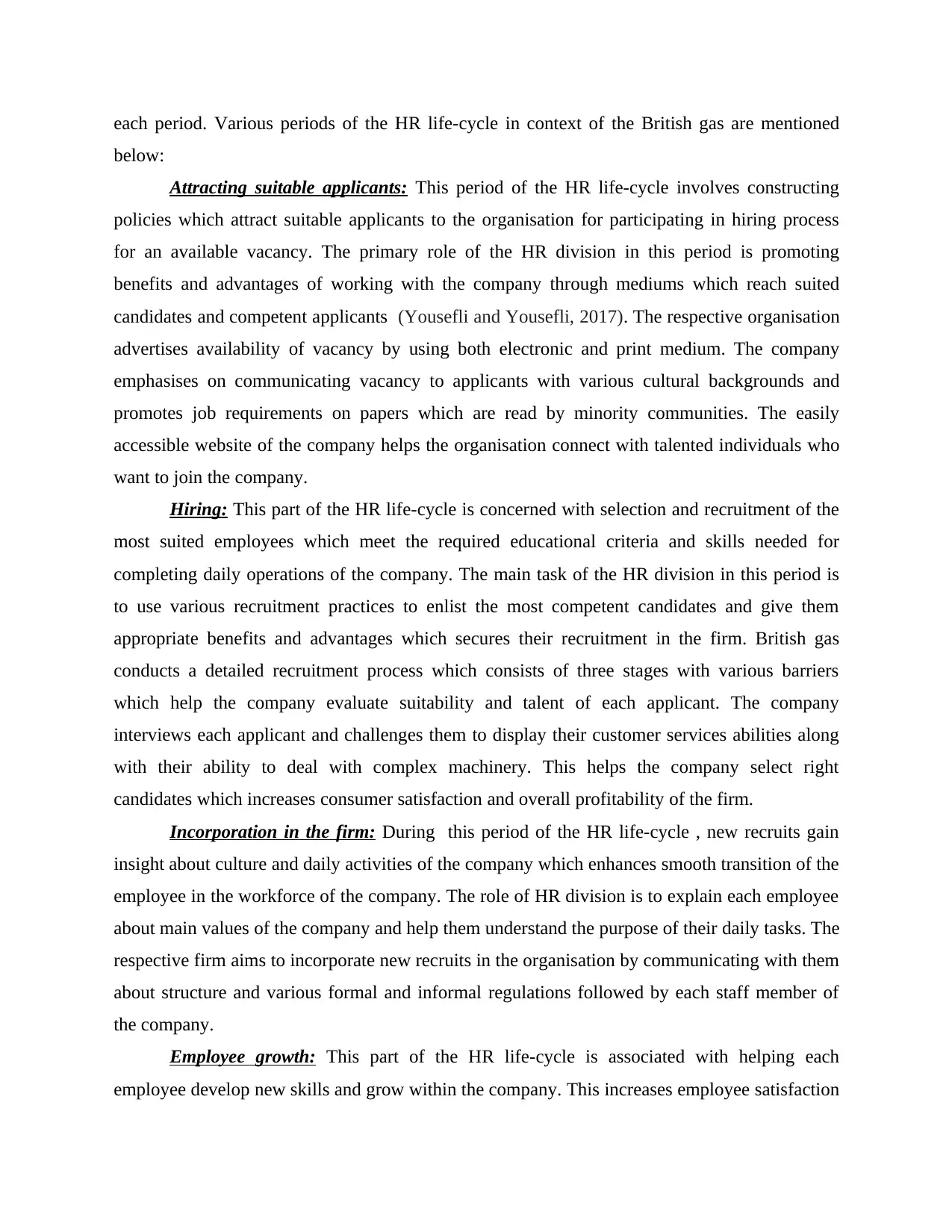
each period. Various periods of the HR life-cycle in context of the British gas are mentioned
below:
Attracting suitable applicants: This period of the HR life-cycle involves constructing
policies which attract suitable applicants to the organisation for participating in hiring process
for an available vacancy. The primary role of the HR division in this period is promoting
benefits and advantages of working with the company through mediums which reach suited
candidates and competent applicants (Yousefli and Yousefli, 2017). The respective organisation
advertises availability of vacancy by using both electronic and print medium. The company
emphasises on communicating vacancy to applicants with various cultural backgrounds and
promotes job requirements on papers which are read by minority communities. The easily
accessible website of the company helps the organisation connect with talented individuals who
want to join the company.
Hiring: This part of the HR life-cycle is concerned with selection and recruitment of the
most suited employees which meet the required educational criteria and skills needed for
completing daily operations of the company. The main task of the HR division in this period is
to use various recruitment practices to enlist the most competent candidates and give them
appropriate benefits and advantages which secures their recruitment in the firm. British gas
conducts a detailed recruitment process which consists of three stages with various barriers
which help the company evaluate suitability and talent of each applicant. The company
interviews each applicant and challenges them to display their customer services abilities along
with their ability to deal with complex machinery. This helps the company select right
candidates which increases consumer satisfaction and overall profitability of the firm.
Incorporation in the firm: During this period of the HR life-cycle , new recruits gain
insight about culture and daily activities of the company which enhances smooth transition of the
employee in the workforce of the company. The role of HR division is to explain each employee
about main values of the company and help them understand the purpose of their daily tasks. The
respective firm aims to incorporate new recruits in the organisation by communicating with them
about structure and various formal and informal regulations followed by each staff member of
the company.
Employee growth: This part of the HR life-cycle is associated with helping each
employee develop new skills and grow within the company. This increases employee satisfaction
below:
Attracting suitable applicants: This period of the HR life-cycle involves constructing
policies which attract suitable applicants to the organisation for participating in hiring process
for an available vacancy. The primary role of the HR division in this period is promoting
benefits and advantages of working with the company through mediums which reach suited
candidates and competent applicants (Yousefli and Yousefli, 2017). The respective organisation
advertises availability of vacancy by using both electronic and print medium. The company
emphasises on communicating vacancy to applicants with various cultural backgrounds and
promotes job requirements on papers which are read by minority communities. The easily
accessible website of the company helps the organisation connect with talented individuals who
want to join the company.
Hiring: This part of the HR life-cycle is concerned with selection and recruitment of the
most suited employees which meet the required educational criteria and skills needed for
completing daily operations of the company. The main task of the HR division in this period is
to use various recruitment practices to enlist the most competent candidates and give them
appropriate benefits and advantages which secures their recruitment in the firm. British gas
conducts a detailed recruitment process which consists of three stages with various barriers
which help the company evaluate suitability and talent of each applicant. The company
interviews each applicant and challenges them to display their customer services abilities along
with their ability to deal with complex machinery. This helps the company select right
candidates which increases consumer satisfaction and overall profitability of the firm.
Incorporation in the firm: During this period of the HR life-cycle , new recruits gain
insight about culture and daily activities of the company which enhances smooth transition of the
employee in the workforce of the company. The role of HR division is to explain each employee
about main values of the company and help them understand the purpose of their daily tasks. The
respective firm aims to incorporate new recruits in the organisation by communicating with them
about structure and various formal and informal regulations followed by each staff member of
the company.
Employee growth: This part of the HR life-cycle is associated with helping each
employee develop new skills and grow within the company. This increases employee satisfaction
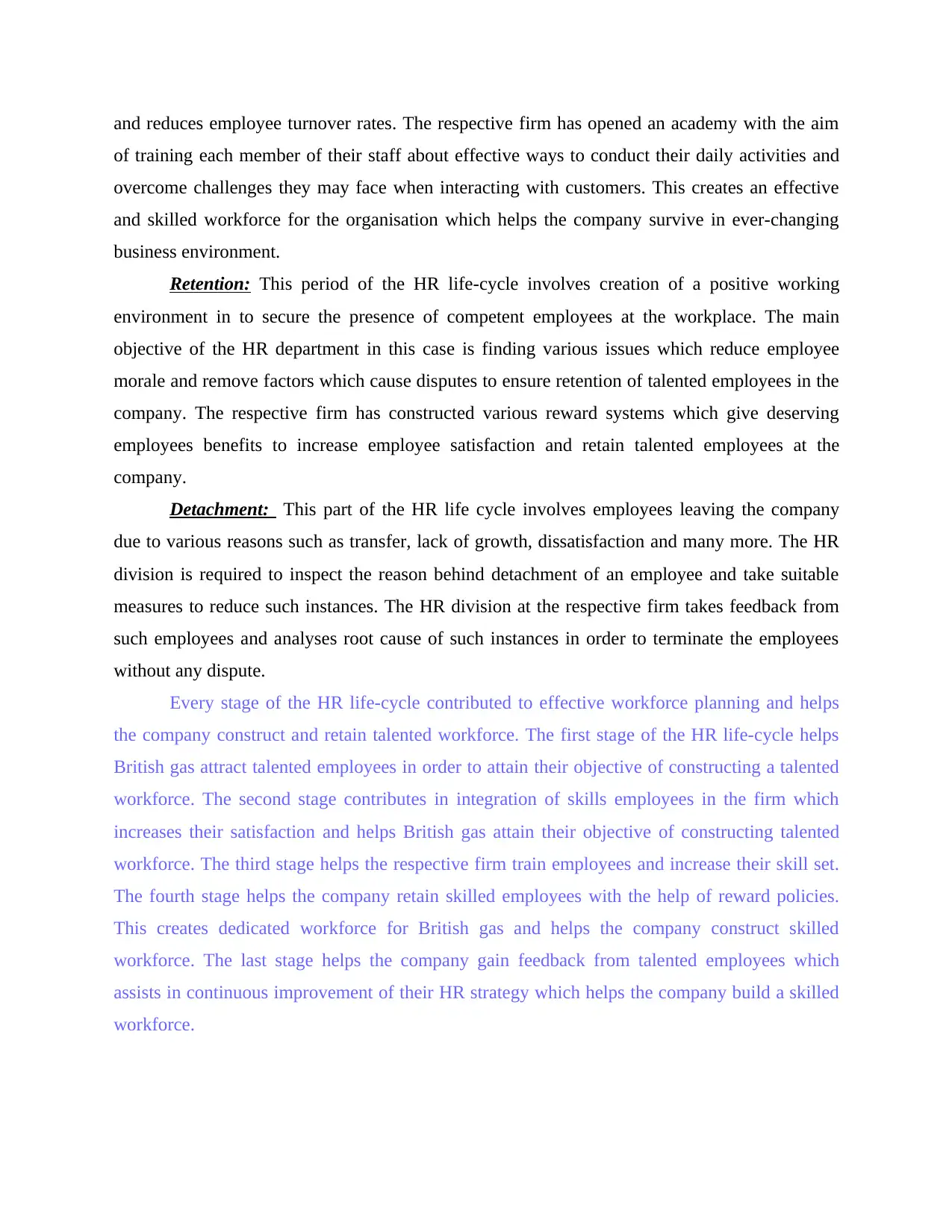
and reduces employee turnover rates. The respective firm has opened an academy with the aim
of training each member of their staff about effective ways to conduct their daily activities and
overcome challenges they may face when interacting with customers. This creates an effective
and skilled workforce for the organisation which helps the company survive in ever-changing
business environment.
Retention: This period of the HR life-cycle involves creation of a positive working
environment in to secure the presence of competent employees at the workplace. The main
objective of the HR department in this case is finding various issues which reduce employee
morale and remove factors which cause disputes to ensure retention of talented employees in the
company. The respective firm has constructed various reward systems which give deserving
employees benefits to increase employee satisfaction and retain talented employees at the
company.
Detachment: This part of the HR life cycle involves employees leaving the company
due to various reasons such as transfer, lack of growth, dissatisfaction and many more. The HR
division is required to inspect the reason behind detachment of an employee and take suitable
measures to reduce such instances. The HR division at the respective firm takes feedback from
such employees and analyses root cause of such instances in order to terminate the employees
without any dispute.
Every stage of the HR life-cycle contributed to effective workforce planning and helps
the company construct and retain talented workforce. The first stage of the HR life-cycle helps
British gas attract talented employees in order to attain their objective of constructing a talented
workforce. The second stage contributes in integration of skills employees in the firm which
increases their satisfaction and helps British gas attain their objective of constructing talented
workforce. The third stage helps the respective firm train employees and increase their skill set.
The fourth stage helps the company retain skilled employees with the help of reward policies.
This creates dedicated workforce for British gas and helps the company construct skilled
workforce. The last stage helps the company gain feedback from talented employees which
assists in continuous improvement of their HR strategy which helps the company build a skilled
workforce.
of training each member of their staff about effective ways to conduct their daily activities and
overcome challenges they may face when interacting with customers. This creates an effective
and skilled workforce for the organisation which helps the company survive in ever-changing
business environment.
Retention: This period of the HR life-cycle involves creation of a positive working
environment in to secure the presence of competent employees at the workplace. The main
objective of the HR department in this case is finding various issues which reduce employee
morale and remove factors which cause disputes to ensure retention of talented employees in the
company. The respective firm has constructed various reward systems which give deserving
employees benefits to increase employee satisfaction and retain talented employees at the
company.
Detachment: This part of the HR life cycle involves employees leaving the company
due to various reasons such as transfer, lack of growth, dissatisfaction and many more. The HR
division is required to inspect the reason behind detachment of an employee and take suitable
measures to reduce such instances. The HR division at the respective firm takes feedback from
such employees and analyses root cause of such instances in order to terminate the employees
without any dispute.
Every stage of the HR life-cycle contributed to effective workforce planning and helps
the company construct and retain talented workforce. The first stage of the HR life-cycle helps
British gas attract talented employees in order to attain their objective of constructing a talented
workforce. The second stage contributes in integration of skills employees in the firm which
increases their satisfaction and helps British gas attain their objective of constructing talented
workforce. The third stage helps the respective firm train employees and increase their skill set.
The fourth stage helps the company retain skilled employees with the help of reward policies.
This creates dedicated workforce for British gas and helps the company construct skilled
workforce. The last stage helps the company gain feedback from talented employees which
assists in continuous improvement of their HR strategy which helps the company build a skilled
workforce.
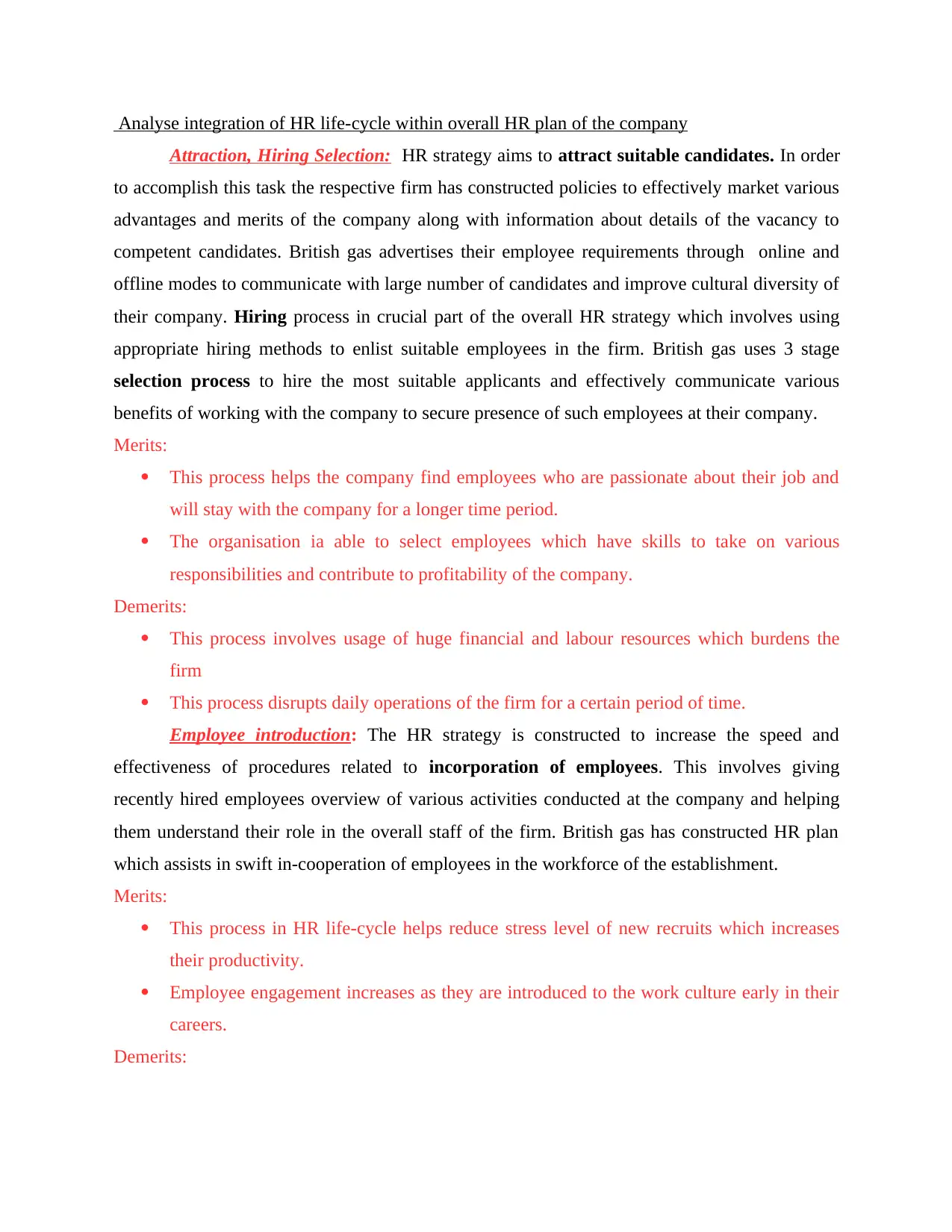
Analyse integration of HR life-cycle within overall HR plan of the company
Attraction, Hiring Selection: HR strategy aims to attract suitable candidates. In order
to accomplish this task the respective firm has constructed policies to effectively market various
advantages and merits of the company along with information about details of the vacancy to
competent candidates. British gas advertises their employee requirements through online and
offline modes to communicate with large number of candidates and improve cultural diversity of
their company. Hiring process in crucial part of the overall HR strategy which involves using
appropriate hiring methods to enlist suitable employees in the firm. British gas uses 3 stage
selection process to hire the most suitable applicants and effectively communicate various
benefits of working with the company to secure presence of such employees at their company.
Merits:
This process helps the company find employees who are passionate about their job and
will stay with the company for a longer time period.
The organisation ia able to select employees which have skills to take on various
responsibilities and contribute to profitability of the company.
Demerits:
This process involves usage of huge financial and labour resources which burdens the
firm
This process disrupts daily operations of the firm for a certain period of time.
Employee introduction: The HR strategy is constructed to increase the speed and
effectiveness of procedures related to incorporation of employees. This involves giving
recently hired employees overview of various activities conducted at the company and helping
them understand their role in the overall staff of the firm. British gas has constructed HR plan
which assists in swift in-cooperation of employees in the workforce of the establishment.
Merits:
This process in HR life-cycle helps reduce stress level of new recruits which increases
their productivity.
Employee engagement increases as they are introduced to the work culture early in their
careers.
Demerits:
Attraction, Hiring Selection: HR strategy aims to attract suitable candidates. In order
to accomplish this task the respective firm has constructed policies to effectively market various
advantages and merits of the company along with information about details of the vacancy to
competent candidates. British gas advertises their employee requirements through online and
offline modes to communicate with large number of candidates and improve cultural diversity of
their company. Hiring process in crucial part of the overall HR strategy which involves using
appropriate hiring methods to enlist suitable employees in the firm. British gas uses 3 stage
selection process to hire the most suitable applicants and effectively communicate various
benefits of working with the company to secure presence of such employees at their company.
Merits:
This process helps the company find employees who are passionate about their job and
will stay with the company for a longer time period.
The organisation ia able to select employees which have skills to take on various
responsibilities and contribute to profitability of the company.
Demerits:
This process involves usage of huge financial and labour resources which burdens the
firm
This process disrupts daily operations of the firm for a certain period of time.
Employee introduction: The HR strategy is constructed to increase the speed and
effectiveness of procedures related to incorporation of employees. This involves giving
recently hired employees overview of various activities conducted at the company and helping
them understand their role in the overall staff of the firm. British gas has constructed HR plan
which assists in swift in-cooperation of employees in the workforce of the establishment.
Merits:
This process in HR life-cycle helps reduce stress level of new recruits which increases
their productivity.
Employee engagement increases as they are introduced to the work culture early in their
careers.
Demerits:
Secure Best Marks with AI Grader
Need help grading? Try our AI Grader for instant feedback on your assignments.
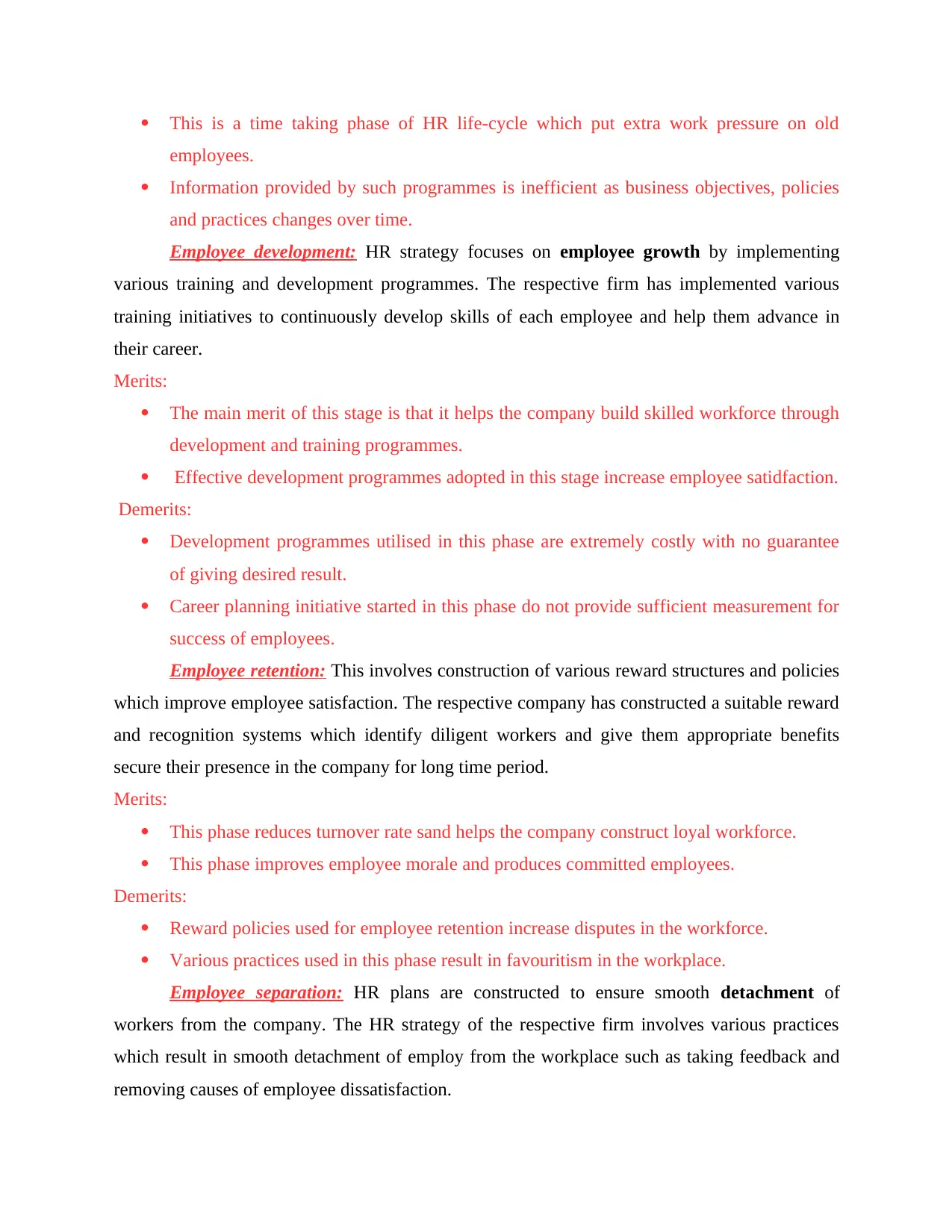
This is a time taking phase of HR life-cycle which put extra work pressure on old
employees.
Information provided by such programmes is inefficient as business objectives, policies
and practices changes over time.
Employee development: HR strategy focuses on employee growth by implementing
various training and development programmes. The respective firm has implemented various
training initiatives to continuously develop skills of each employee and help them advance in
their career.
Merits:
The main merit of this stage is that it helps the company build skilled workforce through
development and training programmes.
Effective development programmes adopted in this stage increase employee satidfaction.
Demerits:
Development programmes utilised in this phase are extremely costly with no guarantee
of giving desired result.
Career planning initiative started in this phase do not provide sufficient measurement for
success of employees.
Employee retention: This involves construction of various reward structures and policies
which improve employee satisfaction. The respective company has constructed a suitable reward
and recognition systems which identify diligent workers and give them appropriate benefits
secure their presence in the company for long time period.
Merits:
This phase reduces turnover rate sand helps the company construct loyal workforce.
This phase improves employee morale and produces committed employees.
Demerits:
Reward policies used for employee retention increase disputes in the workforce.
Various practices used in this phase result in favouritism in the workplace.
Employee separation: HR plans are constructed to ensure smooth detachment of
workers from the company. The HR strategy of the respective firm involves various practices
which result in smooth detachment of employ from the workplace such as taking feedback and
removing causes of employee dissatisfaction.
employees.
Information provided by such programmes is inefficient as business objectives, policies
and practices changes over time.
Employee development: HR strategy focuses on employee growth by implementing
various training and development programmes. The respective firm has implemented various
training initiatives to continuously develop skills of each employee and help them advance in
their career.
Merits:
The main merit of this stage is that it helps the company build skilled workforce through
development and training programmes.
Effective development programmes adopted in this stage increase employee satidfaction.
Demerits:
Development programmes utilised in this phase are extremely costly with no guarantee
of giving desired result.
Career planning initiative started in this phase do not provide sufficient measurement for
success of employees.
Employee retention: This involves construction of various reward structures and policies
which improve employee satisfaction. The respective company has constructed a suitable reward
and recognition systems which identify diligent workers and give them appropriate benefits
secure their presence in the company for long time period.
Merits:
This phase reduces turnover rate sand helps the company construct loyal workforce.
This phase improves employee morale and produces committed employees.
Demerits:
Reward policies used for employee retention increase disputes in the workforce.
Various practices used in this phase result in favouritism in the workplace.
Employee separation: HR plans are constructed to ensure smooth detachment of
workers from the company. The HR strategy of the respective firm involves various practices
which result in smooth detachment of employ from the workplace such as taking feedback and
removing causes of employee dissatisfaction.
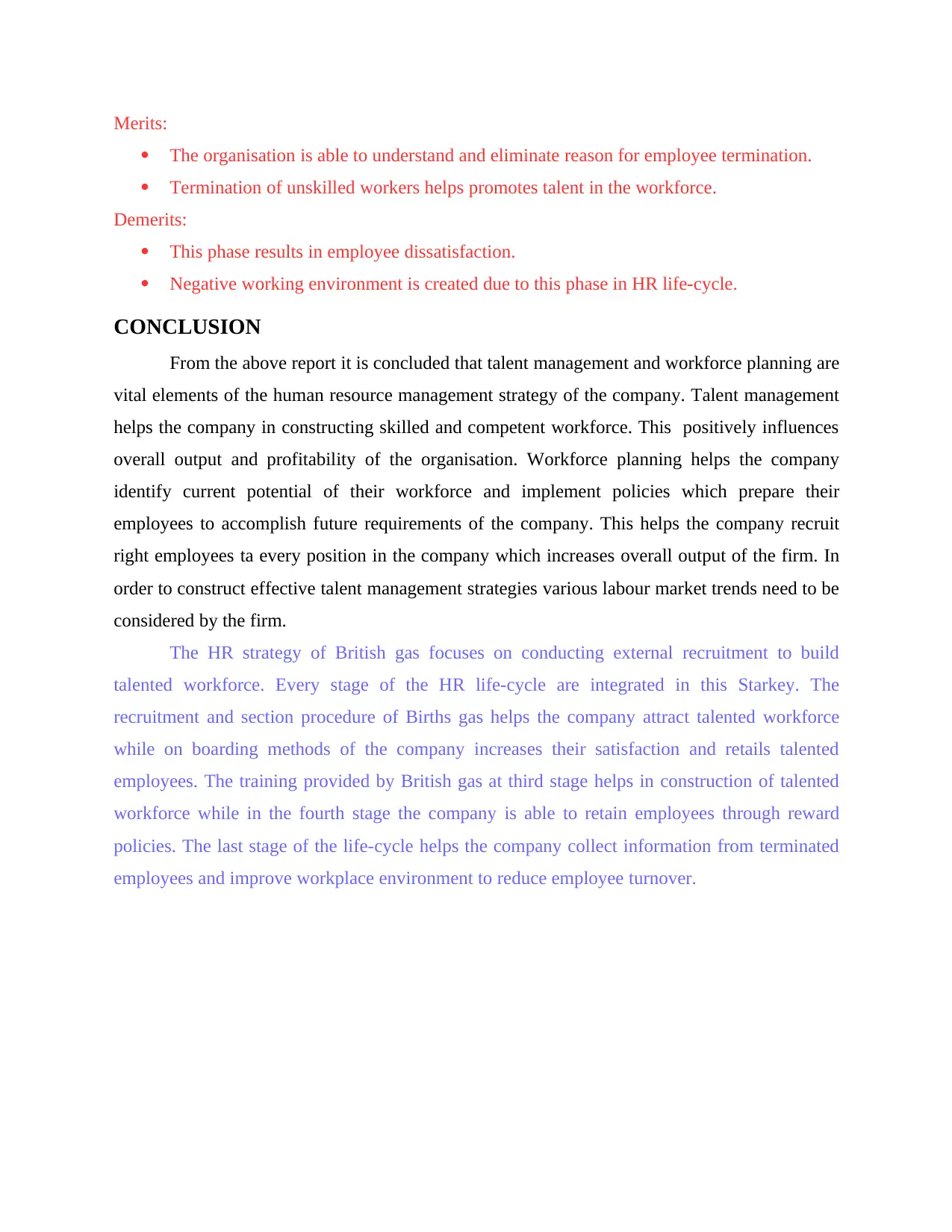
Merits:
The organisation is able to understand and eliminate reason for employee termination.
Termination of unskilled workers helps promotes talent in the workforce.
Demerits:
This phase results in employee dissatisfaction.
Negative working environment is created due to this phase in HR life-cycle.
CONCLUSION
From the above report it is concluded that talent management and workforce planning are
vital elements of the human resource management strategy of the company. Talent management
helps the company in constructing skilled and competent workforce. This positively influences
overall output and profitability of the organisation. Workforce planning helps the company
identify current potential of their workforce and implement policies which prepare their
employees to accomplish future requirements of the company. This helps the company recruit
right employees ta every position in the company which increases overall output of the firm. In
order to construct effective talent management strategies various labour market trends need to be
considered by the firm.
The HR strategy of British gas focuses on conducting external recruitment to build
talented workforce. Every stage of the HR life-cycle are integrated in this Starkey. The
recruitment and section procedure of Births gas helps the company attract talented workforce
while on boarding methods of the company increases their satisfaction and retails talented
employees. The training provided by British gas at third stage helps in construction of talented
workforce while in the fourth stage the company is able to retain employees through reward
policies. The last stage of the life-cycle helps the company collect information from terminated
employees and improve workplace environment to reduce employee turnover.
The organisation is able to understand and eliminate reason for employee termination.
Termination of unskilled workers helps promotes talent in the workforce.
Demerits:
This phase results in employee dissatisfaction.
Negative working environment is created due to this phase in HR life-cycle.
CONCLUSION
From the above report it is concluded that talent management and workforce planning are
vital elements of the human resource management strategy of the company. Talent management
helps the company in constructing skilled and competent workforce. This positively influences
overall output and profitability of the organisation. Workforce planning helps the company
identify current potential of their workforce and implement policies which prepare their
employees to accomplish future requirements of the company. This helps the company recruit
right employees ta every position in the company which increases overall output of the firm. In
order to construct effective talent management strategies various labour market trends need to be
considered by the firm.
The HR strategy of British gas focuses on conducting external recruitment to build
talented workforce. Every stage of the HR life-cycle are integrated in this Starkey. The
recruitment and section procedure of Births gas helps the company attract talented workforce
while on boarding methods of the company increases their satisfaction and retails talented
employees. The training provided by British gas at third stage helps in construction of talented
workforce while in the fourth stage the company is able to retain employees through reward
policies. The last stage of the life-cycle helps the company collect information from terminated
employees and improve workplace environment to reduce employee turnover.
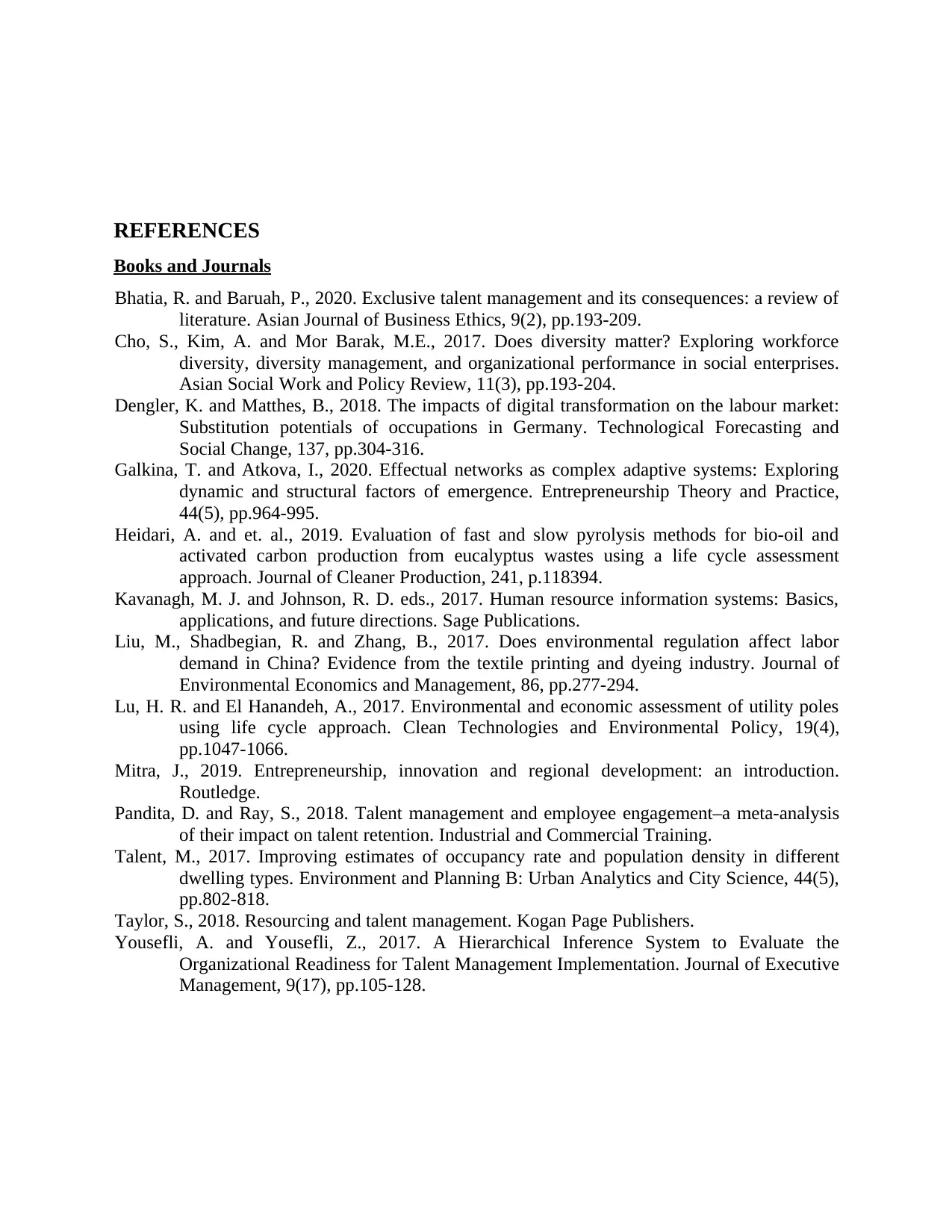
REFERENCES
Books and Journals
Bhatia, R. and Baruah, P., 2020. Exclusive talent management and its consequences: a review of
literature. Asian Journal of Business Ethics, 9(2), pp.193-209.
Cho, S., Kim, A. and Mor Barak, M.E., 2017. Does diversity matter? Exploring workforce
diversity, diversity management, and organizational performance in social enterprises.
Asian Social Work and Policy Review, 11(3), pp.193-204.
Dengler, K. and Matthes, B., 2018. The impacts of digital transformation on the labour market:
Substitution potentials of occupations in Germany. Technological Forecasting and
Social Change, 137, pp.304-316.
Galkina, T. and Atkova, I., 2020. Effectual networks as complex adaptive systems: Exploring
dynamic and structural factors of emergence. Entrepreneurship Theory and Practice,
44(5), pp.964-995.
Heidari, A. and et. al., 2019. Evaluation of fast and slow pyrolysis methods for bio-oil and
activated carbon production from eucalyptus wastes using a life cycle assessment
approach. Journal of Cleaner Production, 241, p.118394.
Kavanagh, M. J. and Johnson, R. D. eds., 2017. Human resource information systems: Basics,
applications, and future directions. Sage Publications.
Liu, M., Shadbegian, R. and Zhang, B., 2017. Does environmental regulation affect labor
demand in China? Evidence from the textile printing and dyeing industry. Journal of
Environmental Economics and Management, 86, pp.277-294.
Lu, H. R. and El Hanandeh, A., 2017. Environmental and economic assessment of utility poles
using life cycle approach. Clean Technologies and Environmental Policy, 19(4),
pp.1047-1066.
Mitra, J., 2019. Entrepreneurship, innovation and regional development: an introduction.
Routledge.
Pandita, D. and Ray, S., 2018. Talent management and employee engagement–a meta-analysis
of their impact on talent retention. Industrial and Commercial Training.
Talent, M., 2017. Improving estimates of occupancy rate and population density in different
dwelling types. Environment and Planning B: Urban Analytics and City Science, 44(5),
pp.802-818.
Taylor, S., 2018. Resourcing and talent management. Kogan Page Publishers.
Yousefli, A. and Yousefli, Z., 2017. A Hierarchical Inference System to Evaluate the
Organizational Readiness for Talent Management Implementation. Journal of Executive
Management, 9(17), pp.105-128.
Books and Journals
Bhatia, R. and Baruah, P., 2020. Exclusive talent management and its consequences: a review of
literature. Asian Journal of Business Ethics, 9(2), pp.193-209.
Cho, S., Kim, A. and Mor Barak, M.E., 2017. Does diversity matter? Exploring workforce
diversity, diversity management, and organizational performance in social enterprises.
Asian Social Work and Policy Review, 11(3), pp.193-204.
Dengler, K. and Matthes, B., 2018. The impacts of digital transformation on the labour market:
Substitution potentials of occupations in Germany. Technological Forecasting and
Social Change, 137, pp.304-316.
Galkina, T. and Atkova, I., 2020. Effectual networks as complex adaptive systems: Exploring
dynamic and structural factors of emergence. Entrepreneurship Theory and Practice,
44(5), pp.964-995.
Heidari, A. and et. al., 2019. Evaluation of fast and slow pyrolysis methods for bio-oil and
activated carbon production from eucalyptus wastes using a life cycle assessment
approach. Journal of Cleaner Production, 241, p.118394.
Kavanagh, M. J. and Johnson, R. D. eds., 2017. Human resource information systems: Basics,
applications, and future directions. Sage Publications.
Liu, M., Shadbegian, R. and Zhang, B., 2017. Does environmental regulation affect labor
demand in China? Evidence from the textile printing and dyeing industry. Journal of
Environmental Economics and Management, 86, pp.277-294.
Lu, H. R. and El Hanandeh, A., 2017. Environmental and economic assessment of utility poles
using life cycle approach. Clean Technologies and Environmental Policy, 19(4),
pp.1047-1066.
Mitra, J., 2019. Entrepreneurship, innovation and regional development: an introduction.
Routledge.
Pandita, D. and Ray, S., 2018. Talent management and employee engagement–a meta-analysis
of their impact on talent retention. Industrial and Commercial Training.
Talent, M., 2017. Improving estimates of occupancy rate and population density in different
dwelling types. Environment and Planning B: Urban Analytics and City Science, 44(5),
pp.802-818.
Taylor, S., 2018. Resourcing and talent management. Kogan Page Publishers.
Yousefli, A. and Yousefli, Z., 2017. A Hierarchical Inference System to Evaluate the
Organizational Readiness for Talent Management Implementation. Journal of Executive
Management, 9(17), pp.105-128.
1 out of 19
Related Documents
Your All-in-One AI-Powered Toolkit for Academic Success.
+13062052269
info@desklib.com
Available 24*7 on WhatsApp / Email
![[object Object]](/_next/static/media/star-bottom.7253800d.svg)
Unlock your academic potential
© 2024 | Zucol Services PVT LTD | All rights reserved.





